![]()
![]()
The flower sellers and the popcorn venders were having a field day. The streets were jammed with traffic diverted from the University. Sales would be good.
 A range of different modes of transport plying Dhaka streets, makes the city roads difficult to negotiate. ? Shahidul Alam/Drik/Majority World
A range of different modes of transport plying Dhaka streets, makes the city roads difficult to negotiate. ? Shahidul Alam/Drik/Majority World
Dhaka University turned into a cantonment,’ said Rahnuma’s text message. I was hurrying to the CMM court in Old Dhaka where the trial of the university teachers was taking place. As I pedaled through the gaps between cars, rickshaws, CNGs (gas run three wheelers) and thalagaris (push carts) I felt glad I was on a bicycle.
 Dhaka University teachers leaving the CMM court in Old Dhaka. ? Shahidul Alam/Drik/Majority World
Dhaka University teachers leaving the CMM court in Old Dhaka. ? Shahidul Alam/Drik/Majority World
Ocassionally biking along the footpath, not strictly legal, I was slowed by the vending stalls and bus ticket counters that had sprung up. Legality was not such a big thing here.
 Bus ticket sellers in New Elephant Road. ? Shahidul Alam/Drik/Majority
Bus ticket sellers in New Elephant Road. ? Shahidul Alam/Drik/Majority
Last night, the guards had caught a guy stealing copper cabling. The thief was a “heroinchi”. They had roughed him up and let him go. Taking the guy to the police wouldn’t have helped. The police would have got richer and the guy would be out stealing again. People take law into their own hands. Bribes are common-place, violence is normalised, nepotism is ripe. Despite the rhetoric at the top, abuse of power is the order of the day. But there is a sub-text. It was wrong of the heroinchi to have stolen the cable, for me to have used the footpath, for the vendors to have taken over public pathways, for the policeman to have taken bribes. Except in my case, there were mitigating circumstances that made all of the other acts less of a crime. The heroinchi had his addiction to blame. The vendors had no other place to go, police salaries were impossible to live on. They might have found other solutions, but they broke the law instead. Unlawful, but not sinister.
I saw other things along the way. The policeman in Gulistan Mor puncturing the tyre of a rickshaw walla caught on a road reserved for cars.
 Policeman with needle used to puncture rickshaw tyres. ? Shahidul Alam/Drik/Majority World
Policeman with needle used to puncture rickshaw tyres. ? Shahidul Alam/Drik/Majority World

Policeman beating up rickshawalla. ? Shahidul Alam/Drik/Majority World
 Policeman controlling traffic at Nawabpur Road. ? Shahidul Alam/Drik/Majority World
Policeman controlling traffic at Nawabpur Road. ? Shahidul Alam/Drik/Majority World
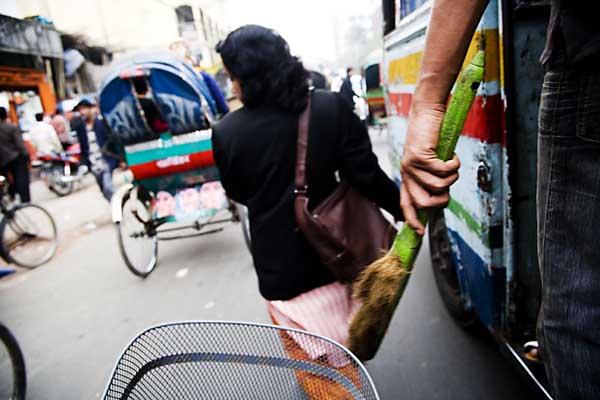 A bus conductor uses a brush handle to beat off nearby rickshaws or other ‘low grade’ traffic. ? Shahidul Alam/Drik/Majority World
A bus conductor uses a brush handle to beat off nearby rickshaws or other ‘low grade’ traffic. ? Shahidul Alam/Drik/Majority World
A policeman on Nawabpur Road, punching a rickshaw walla for some other reason. True, rickshaw wallas don’t always obey the law. But no policeman would have punctured the wheel of a car. No drug baron would ever be roughed up, no hotel owner would ever be shooed off his establishment.



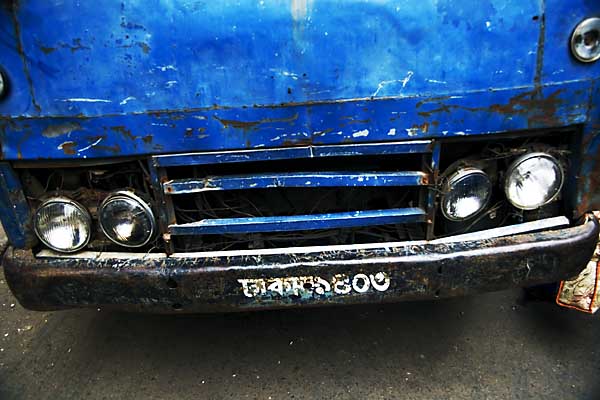 Dilapidated police prison vans outside CMM court. ? Shahidul Alam/Drik/Majority World
Dilapidated police prison vans outside CMM court. ? Shahidul Alam/Drik/Majority World

Military microbus by ‘no parking’ sign near Rapa Plaza in Dhanmondi. ? Shahidul Alam/Drik/Majority World
Few police cars would ever pass a fitness test. The more swank olive green cars, parked illegally, would never be challenged. When power is flouted with such abandon, corruption seeps to all levels. Ordinary people are simply too small to challenge the system. The rule of law must apply to all if it is to work. When the ruling party cannot be challenged, when a military rank gives total authority, when being in power means laws no longer apply, the law of the streets becomes the law of the land.
Much has been said about the students’ protest on campus in August 2007. Little has been said about the cause of the incident. The military cannot occupy a university campus in a free land. It is the duty of any self-respecting student, of any citizen, to challenge such army presence. The arrogance of the soldiers might have aggravated the incident. Their long held belief that they are above the law, surely led to the brutality that followed. But the original crime was one of occupation. And occupation, wherever found, must be resisted.
Why should university students bow to injustice? What values can future citizens uphold having silently accepted the loss of their freedoms? How can a teacher teach knowing he has turned his back to wards being illegally victimised?
 The back door of a prison van waiting outside CMM court. 21st January 2007. ? Shahidul Alam/Drik/Majority World
The back door of a prison van waiting outside CMM court. 21st January 2007. ? Shahidul Alam/Drik/Majority World
To convict and then provide presidential pardon, is an act of self-deification by the government. Those with less clout will continue to languish in jail. A dark and violent jail they should never have entered. If the judiciary be truly independent, then it should call to the docks those who ordered a military occupation of our university. It should bring to trial those who use emergency rule to torture our citizens and muzzle the media. It should penalise those who judge others without subjecting themselves to scrutiny. The rule of law is essential for society to live without fear. For it to apply, it must start at the top.
Category: Human rights
Unruly Images
Masculinity, Public Memory and Censorship
By Rahnuma Ahmed
Because it can be neither forgotten nor redeemed, the past must be changed. To redeem the past one must alter one’s relationship to it… If the problem.. [is that] of a one-dimensional political representation, then what it calls for is not work on the subject — or not just that — but… “political work on the symbolic.”
Linda M. G. Zerilli, The Abyss of Freedom.
Bissrinkhol Drissho: Pourush, Public Smriti O Censorship attempts to do that. To politically work on that which is symbolic. It came out recently, as a small booklet. My article is prefaced by a foreword written by Abdullah al-Mamun, who teaches Mass Communication and Journalism at Rajshahi University. He was released from prison nearly six weeks ago, alongwith three other teachers, Moloy Kumar Bhowmik, Dulal Chandra Biswas and Selim Reza Newton. They were granted presidential clemency on 10 December 2007. Incidentally, neither the teachers, nor their wives, had appealed for a presidential pardon.
They have been released from prison, but not from the farce that the government is carrying out with public university teachers, students and employees. The clemency covers conviction and punishment, but the government has not withdrawn the case against them. Mamun and the others appear in court on January 28, when appeal hearings begin.
The newly-appointed education advisor while talking to news reporters about the case against Dhaka university teachers, unwittingly exposed the farce. “Whatever be the verdict,” he said in all seriousness, the teachers will be “released soon.”
Whatever be this week’s outcome, these famous last lines will not be easily forgotten.
Not a straight-forward affair
Photographs. And people. The connection is not a simple one. `Hey, I didn’t know you had gone to Rajendrapur?’ `Just that once, the picnic was terrible.’ Photographs capture a particular moment, but to know whether that moment is something out of the ordinary, whether it represents a whim or a regular habit, we need people. We need testimony. Thus, what a photograph can tell us has its limits. Documentary photographs, at times, may not give us the feeling of recognition we expect, “Is that you? I would never have guessed.” Sometimes they may be pretty inaccurate. Also, there is the question of interpretation. “Hmm, looks like the two of you had snuggled up real close…” “No, no it’s the angle, he was at least five feet away.” As I said, the connection between people and photographs is not a straightforward affair.
Mishaps may happen. Ordinary people may feel piqued on seeing the results, “The light wasn’t good” or, “She’s a lousy photographer,” but rulers are less likely to take them kindly. Specially, if it unravels carefully-constructed identities. Group identities of patriotism and disinterested professionalism. Identities crucial to legitimising. Identities essential for individual ambitions.
Censorship is often thought of stereotypically. As a prohibition, a ban on disclosure. Mamoon, in his foreword to Bissrinkhol Drissho (henceforth Unruly Images) argues differently. He writes, censorship is relational. It is oppositional. Desired images, destined for circulation, are continuously produced and re-produced while undesirable ones are stifled. Both occur simultaneously to construct a reality that meets the expectations of rulers.
Dhaka University incident: unruly images
Unruly Images is about the regime of visual images, not flesh-and-blood people. In it I take a close look at two photographs generated during the Dhaka University protests of August 2007. The military-backed caretaker government came to power in January 2007. Soon after, a perceptible change took place in the world of visual representations, in the world of images. Military masculinity came to be foregrounded as a distinct form of masculinity, in opposition to civilian masculinity, its silent other. TV, both government and private channels, and the print media were the primary instruments used to effect the change. The act of foregrounding re-drew the difference between civilian and military as a primary one, something qualitatively different to the multiplicity of competing masculine images, leader, cadre, executive, mastan, businesman etc seen during the period of elected governments, 1990-2007. In military song video performances regularly screened on TV, military masculinity is portrayed as infinitely courageous, whether on the training ground, in the battle for liberation, or soldiering for peace in faraway lands. The army uniform emerges as a symbol of discipline, regularity, order, control, restraint, punctuality. In writing this, my concern is not with its truth, it is solely with images, with portraiture. The song-video images lack social depth. There are no folds, no seams, no hesitancies, and as such, they are propagandistic. Being fragile, they are unable to withstand the realities of life. They falter if not propped up by the state. Their fragility grieves the creators, their grief and pain is expressed in language founded on the state’s powers of coercion. As happened in the case of Dhaka University, in August 2007.
The publication of the first photograph, the censored one, created disorder in the world of images. To restore order, it became necessary to introduce the second image, Professor Anwar Hossain’s apology to the armed forces. This image was generously circulated, distributed and re-distributed, over and over again. The times however were tumultuous, one event rapidly followed the other. That the two photographs are linked, in a cause-and-effect fashion, was something overlooked. Looking at one image brings back memories of the other. It was an oversight. Such things do happen, even with the best of intentions.

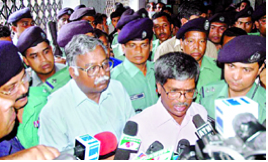
If the first image is censored, how does one talk about it? How do I convey to readers what is in the photograph? How does one manoeuver around censorship restrictions?
Three sources exist, highly reliable sources, not-censored sources, that offer us a language to talk about them. One is Professor Anwar Hossain’s statement itself, a primary text, an authentic one since those to whom it is addressed have not raised any objections. Of the other two sources, one is to be found on the Bangladesh armed forces website (Dhaka Bisshobiddaloyer Shongothito Opritikor Ghotonatir Itikotha); the other is also military, but un-official http://www.bdmilitary.com/.
In Professor Anwar Hossain’s statement, one comes across the lines of opposition: army/military versus civilian. Civilian is expressed through different words, “students,” “Dhaka university,” “teacher,” “General Secretary of Dhaka University Teachers Association” ” guardian of the students.” These words give us an idea of place, time, the actors involved. A happening seems to have occurred, one that involves action and reaction. Professor Anwar mentions the word “attack” five times. I assume, from the logic of the apology offered, that a student has attacked a member of the army. The nature of the attack? The title of a BMF report found on its website indicates an unarmed attack, The “Flying Kicker” Identified (for those who don’t know, Bangladesh Military Forces Group is an independent, non-governmental, non-political and non-profit association of research on defence and strategic issues). “The” and “Kicker,” are telltale words that indicate one student, not many. Other words indicate one army member only, “an attack on a member of the army means an attack on the armed forces, as a whole”. He must have been in uniform, or else why would Professor Hossain say, “The agitated students even attacked [members of the] army in uniform” “If anyone attacks the uniform of a member of the army…”
I find the elision between “uniform”, “a member of the army”, and “the army as a whole” in Professor Hossain’s statement, and in the other sources, breathtaking. The elision is re-inforced in the mapping-out of the army: from the ordinary jawan at the lower rungs, to the army chief at the top. Map the text on to the image and one gets frightening results, a student becomes representative of Dhaka University as a whole, of the civilian sector as a whole. A hapless member of the army becomes representative of the army as a whole, of its honour and respect. In the process, a particular meaning gets attached to the army — the lack of courage. Images of valour and courage present in the war of liberation in 1971, in UN peacekeeping missions abroad, recede.
Why were the words that spoke of the students’ self-respect, the ordinary peoples self-respect censored? Why was Professor Anwar allowed to make a statement to the press? After all, he was in remand (allegations of physical and mental torture). Why was the elision permitted? It only serves to fracture national unity on civilian vs miltary lines.
The events at Dhaka university speak of a story of humiliation. Of revenge. Of arrogance and ill-conceived strategies. Of unintended consequences.
Freedom of Expression Roundtable
Amnesty International launches Bangla website and discusses freedom of expression in Bangladesh
8 January 2008
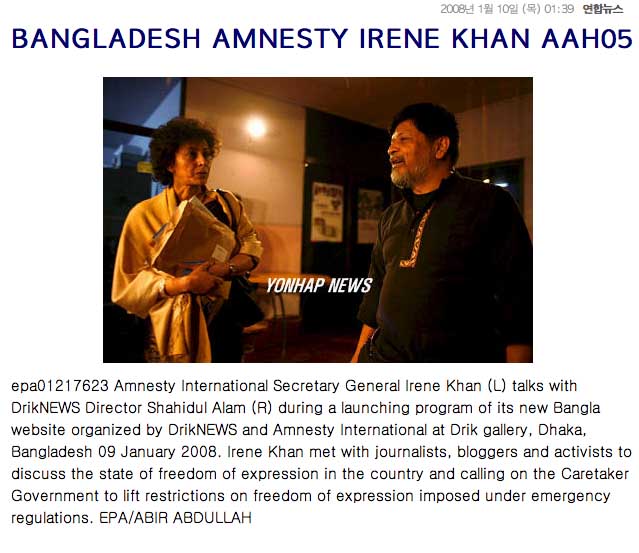 Feature on Korean media
Feature on Korean media
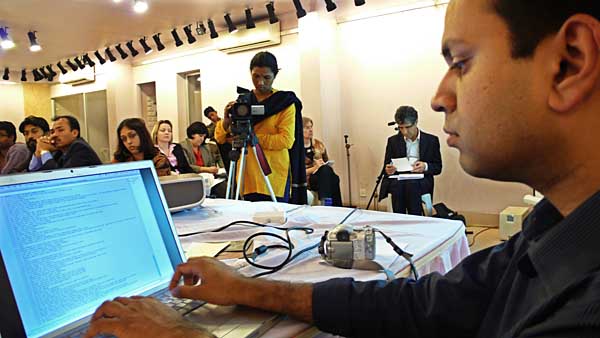 Asif Salef of Drishtipat, uploading the live text stream (text provided below). ? Shahidul Alam/Drik/Majority World
Asif Salef of Drishtipat, uploading the live text stream (text provided below). ? Shahidul Alam/Drik/Majority World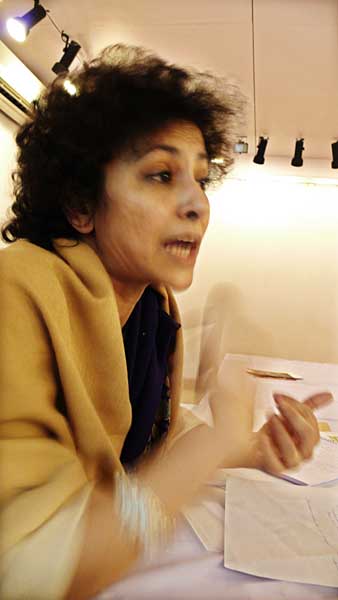 Irene Khan, secretary general of Amnesty International speaking at the “Freedom of Expression” roundtable at Drik. ? Shahidul Alam/Drik/Majority World
Irene Khan, secretary general of Amnesty International speaking at the “Freedom of Expression” roundtable at Drik. ? Shahidul Alam/Drik/Majority World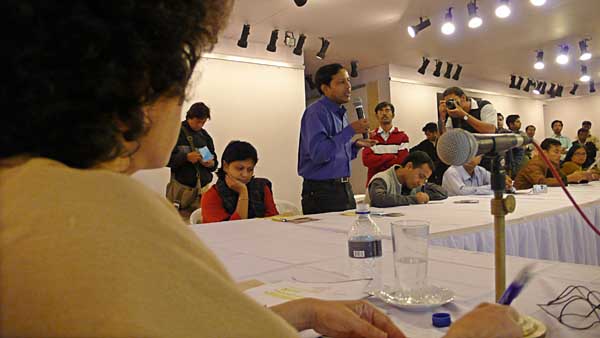 Journalist Jahangir Alam Akash talking of being tortured by military while pursuing an investigation. ? Shahidul Alam/Drik/Majority World. In an email Jahangir informs us: yesterday night, police went my previous house of uposhahor in rajshahi for arrest me, when i attend in a roundtable in dhaka in presence of amnesty international secretary general irene khan.
Journalist Jahangir Alam Akash talking of being tortured by military while pursuing an investigation. ? Shahidul Alam/Drik/Majority World. In an email Jahangir informs us: yesterday night, police went my previous house of uposhahor in rajshahi for arrest me, when i attend in a roundtable in dhaka in presence of amnesty international secretary general irene khan.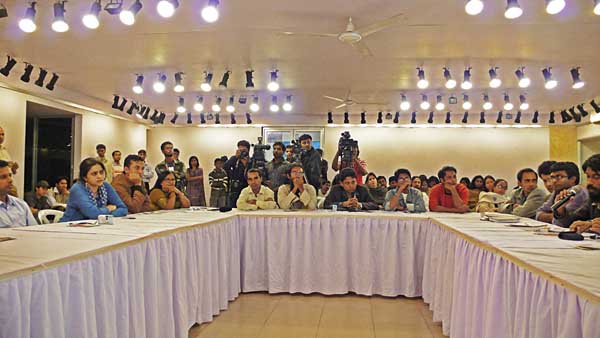 Participants at “Freedom of Expression” roundtable at Drik on 9th January 2007. ? Shahidul Alam/Drik/Majority World
Participants at “Freedom of Expression” roundtable at Drik on 9th January 2007. ? Shahidul Alam/Drik/Majority World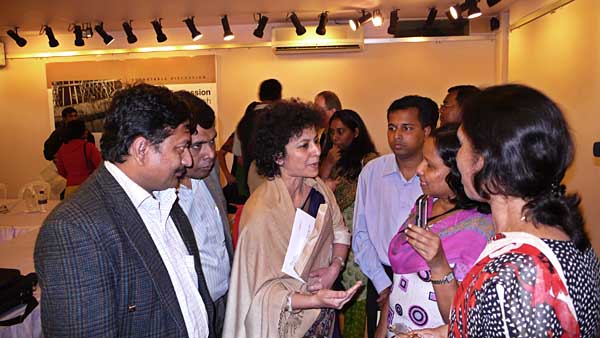 Irene Khan, secretary general of Amnesty International speaking to participants at the “Freedom of Expression” roundtable at Drik. ? Shahidul Alam/Drik/Majority World
Irene Khan, secretary general of Amnesty International speaking to participants at the “Freedom of Expression” roundtable at Drik. ? Shahidul Alam/Drik/Majority WorldTranscription by Asif Saleh/Drishtipat
Thanks to the technical team who helped set this up.
=========
greetings
the secretary general of amnesty international irene khan is with us
Shahidul Alam introducing
Irene Khan is not only a Bangladeshi but also first muslim woman head of Amnesty
We will have this show in a different format than usual
This will be a discussion and not room for speech
We want to create dialogue
Shahidul thanking all.
Irene introducing speech with a history of Amnesty
Irene talking…when I am in bangladesh from higher level it seems there is a lively media
But there must be another story
I met the army chief today and expressed my views about freedom of expression
For years now we have picked up a steady stream of journalists who have been attacked and wounded
In times of change we desperately need room for freedom of expression.
I am going to try get a complete picture from every one.
Shahidul now saying we are going to try to keep the discussion small
My name is Akash
I used to work for CSB new
The roundtable is very important for me
I want to get a little bit of time for myself.
because my rights have been severely hampered
Akash describing the story of how his rights were violated
I reported a story in CSB news when a father was shot by RAB infront of his daughter and I got persecuted for this.
Akash describing the process in details….how he has been fleeing for 3 months
he has been living a crippled life for the past 3 months
The oppression that happened to me
Akash has broken down in tears
Describing the judicial process.
Even though the high court has given him bail but still the local court still has issued a warrant against me.
There may be a lot more Akashes out there
Jahirul Huq Tito , Manik Saha to name a few over the years.
I want to live a free life
I want to go back to my profession.
and work for humanity
I want to dream of a new Bangladesh…I don’t want the oppression that has happened against me to happen to any body else,
Irene is speaking
We knew about your case
When you were in detention, I explained your case very forcefully to the foreign adviser.
You said that you do not want justice but just want to live and that shows the desperation of the case.
I want to assure you that Amnesty will do every thing they can.
parvin Sultana asks whether irene feels that we have press freedom in Bangladesh
sanjib drong of adivasi forum speaks..
Describes the case of Cholesh Richil..who was killed on March in Modhupur.
by the joint forces
The killing on the indigenous community is always justified.
I want to request you to take up the case of cholesh richil and follow through.
The perpetrators know that if indignous leaders are killed then nothing happens and that is only going to encourage more killing
I would like Amnesty to find out at what stage the investigation reports are held
Irene speaks.
Irene: We have already picked up the case and already spoke to high level cases.
High level admins
There has been no prosecution on the case
A crime has been committed but no justice has been serveed.
Pavel partha speaks
I want to highlight the violence of the multinational companies.
Companies like Monsanto ..
Our natural resouces are being stolen,
cases like Phulbari is an example of what multinationals can do in the name of progress
Corporations are violating our rights
we want to know what Amnesty can do to highlight this…
Faruq Wasif of Prothom Alo speaks
thank you irene..
Your coming to Bangladesh and solving individual cases are not the solution
we want to highlight the case of 1971….Amnesty was silent during the war of 71
Similarly your stand in this visit was very mild.
Doesn’t it show a very tolerant view of Amnesty towards military regimes?
Omi Rahman Pial speaks from bdnews24…
I am a blogger
What is the limit of my work?
I see Akash in front of me and I fear what may happen to me and what I need to do so that it doesn’t happen to me?
We have lots of irregularities and working under lots of pressure…
I can’t publish news at the right time because our internet will be brought down , calls will be made etc.
Jornalist from Samakal
We are living in an era of depression rather than free expression
I want to hear from Irene — how is she explaining Bangladesh’s current state.
I want to understand the total role of Amnesty in current Bangladeshi situation.
Anisur Rahman from New Age speaks
Cholesh is from my village
Cholesh was a symbol of free expression as well.
Cholesh used to speak for others in the community.
That’s why Cholesh was targetted
They tried not to kill the person Chalesh but silence a whole community.
Garments workers are not getting their salaries but when they are protesting, they are being taken to court.
Also want to highlight the case of tasneem khalil
We don’t know where he is today,
He was a blogger and a journalist at Daily Star.
We are seeing freedom of expression only for a few folks in certain commissions of the government.
He is now talking about some inconsistencies on tax loop holes
not sure..why 🙂
those who are on the web…this is not alam…but asif.
Shahidul asks to keep things shorts
Biplab Rahman , a blogger and journalist speaks
highlights internet monitoring.
telephone tapping
I have done a lot of research on Chittagong Hill tracks
and I want to highlight why mobile network is not there is those 3 disrticts
Therer were towers placed by the telecom companies but it was taken down by the local armed forces
I wanted to highlight the cases of university teachers as well…and think they should be released
Tipu Sultan from Prothom Alo speaks.
The journalists outside Dhaka lives under severe restriction
All the news are screened by authorities
They can not send the news of fertiliser crisis because of joint forces restrictions
They regularly face the threat of extortion cases from the local forces
But the authorities in Dhaka know this but they still deny it.
BUt the Dhaka journalists are doing much better compared to them.
Yesterday there was a case like that in Thaurgaon.
Udisa Islam speaks
Freelancer ..used to be in tv
Another introduction of mine is — I am the wife a teacher who were detained in Rajshahi University,
I am hearing a lot of sad stories..
but what is the worth of presenting this here?
We need to share this stories with each other ALL the time
This I am saying as a grassroots journalist,.
Last Aug 22nd whatever happened in bangladesh, everyone knows
Similarly whatever happenned with the museum statues.
The media played a brave role there.
How were those published and not some other stories?
Journalists oppression goes on for years!!
Its not because of state of emergency
Tipu Sultan (another victim) was not created under State of emergency (SOE)
it will happen again and again.
We need to talk about the whys of that..
Are we going to talk about the 20 students that still in prison from the university crisis?
Hana Shams Ahmed of Daily Star speaks
I want to highlight the kind of censorship after 1/11
We are very demoralised
speacially after the arifur Rahman incident.
We are very demoralised…and we can talk any thing about religion or army,
priscila raj speaks
Want to highlight three things….
Extra judicial killings
How can we work with International orgs to stop creatiion of organizations like RAB
In cases of State of emergency the most suffered are the people who are the most vulnerable in the society ..like the adibashies (indigenious community)
Lastly why do we never see the results of enquiry reports of the investivative commissions
Zaid Islam a photo journalist speaks
Sara Hossain speaks
I am here as a lawyer who represented some of these journalists who were victims in the last few years.
We need to talk about what we can do to stop this.
We always complain about internation conspiracy but we need to work in our own houses as well.
We don;t coordinate our work,.
I highlight time to the stories about slum dwellers and I send the reports to you journalists but no journalists show any interest..
But that is not the case if the story is about a big politician’s bail.
Amirul Rajib, a photo journalist speaks,
When a big crisis happens and media highlights the issue a lot but not many people are found to help them.
other than the family
We don’t have a infrastructure…
to handle these cases.
we all have to have our own personal network…
How can Amnesty help in all these cases to build an infrastructure.
to handle cases of oppression,
and also cases of regular engagement with the grassroots is needed from int orgs.
Anis highlights that no local journalist in Modhupur highlighted Cholesh’s case because they knew that that they will not survive if they highlighted that.
Ataur Rahman of journalists forum thanks to portray the current picture of bangladesh media today.
Amnesty needs to have a presence in Bangladesh.
I want to blame Amnesty for today’s crisis somewhat.
they need to have a presence in Bangladesh.
We have to look at what is happening in South Asia as a whole as well.
Amnesty needs to play a much stronger role.
here
Another question speaking about how unfairly he was sacked from Amnesty Bangladesh 5 years ago.
Najma Chowdhury from Shwadesh Khabor Weekly…
Do you think anything will change after your visit, Irene Khan?
Chandan Shaha from a weekly,,,
He highlights a case where a minister was sacked because of taking a bribe from a multinational
and wonders why the minister got sacked and nothing happened to the multinational.
Irrelevant talk about corruption of govt
Does Amnesty have a way to research these stories? Shouldn’t they already know these things?
Someone from Manusher jonno speaks
tallks about child rights in Bangladesh
what to do for children prisoner?
Shafiqul Huq Mithu speaks about jahirul Huq Tito in Pirojpur.
another journalist who has been taken in to jail by the admin.
Highlighting details of Tito’s ordeal with the court and but law enforcement agency.
Shahidul speaks,
Highlighting the permission that he had to take for the event..
at World press freedom day.
which says that there you can not criticise the govt in such cases.
We are violating law here by criticizing the govt…Shahidul mockingly reminds Irene,
You all highlighted a lot of cases here..
As journalist you tend to be in the present.
But the activists have to take a longer term perspective..otherwise it gets very depressing…
You all talked about today…but we need to talk about the past as well.
When you take a long term view of human rights, there is not a supported political system where human rights are violated…
go back from 1971…there is a thread of impunity where human rights violations have been left unquestioned
National Human Rights Commission is something that can be very powerful
Whether it is going to be a watchdog or a lapdog, it will all depend on how much pressure we ALL can create
A lot of people told me that this year extra judicial killiing have been reduced…but I am not satisfied by such replies.
We need to highlight why they are going on and what is being done to stop it.
ON freedom of expression..
Irene asking why all the draconian rules are necessary under state of emergency..
These rules are hanging like an axe?
for people..
One think that that has struck me after talking to a lot of people…
civil society and govt have understood clearly how they can use international laws and international civil society to protect the human rights in Bangladesh.
One thing to highlight is there is a worldwide network of human rights defenders.
Today’s event is being captured by people worldwide and that says a lot.
about this network,
We have an enormous opportunity in the internet to create a worldwide network..
that is why Amnesty is starting a Bangla Human Rights Portal for everyone.
I hope you all will take part in it and create a network.
What I am saying is not going to solve the problems.
But if we all create a noise together and work for change, change will happen.
We All need to work together.
on this.
We are hoping we will be able to make our website more interactive.
http://www.amnesty.org/bangla
Irene talking about the question on economic and social rights.
and explaining the campaign on human dignity which focuses on poverty.
what is relationship with human rights and climate change , poverty etc …
This is just a partial transcript of the whole conversation that took place.
Faruk Wasif and Irene are having an exchange over whether West has monopoly on human rights
We are closing …
thank you all
Shahidul thanking,,,Naeem, Givan, Asif for organizing this and highlighting the collaboration of a lot of people.
Shahidul ends with saying that the movement is ours whether or not Irene Khan is there or not,
Remembering
![]()
![]()
Recovering Memory. Recovering Dignity
It was 25th March, night. A Pakistani officer accompanied by soldiers entered their Dhaka University flat, dragged out Meghna’s father and and shot him. Jyotirmoy Guhathakurta was a well-known academic. He bled to death slowly, five days later. As he lay dying in Dhaka Medical College Hospital with a bullet wound in his neck, surrounded by doctors too scared to treat him, he repeatedly told Bashanti, his wife, you must write. Write what? History, he replied. But I don’t know how to write history. Well, write literature then.
 Jyotirmay Guhathakurta and Basanti Guhathakurta with seven year old daughter, Meghna and nephew Kanti in Gandaria, Dhaka, 1966. Bangladesh. ? Bazle Mawla
Jyotirmay Guhathakurta and Basanti Guhathakurta with seven year old daughter, Meghna and nephew Kanti in Gandaria, Dhaka, 1966. Bangladesh. ? Bazle Mawla
I met Meghna in 1973, the year we started college. Later we went to Dhaka University together. As we became the closest of friends, I learnt that she would lie in bed each night and recollect the horror of that night in 1971. I would tell myself, I have to remember each incident, what happened, what followed. I must not let myself forget. Many years later, I remember asking her, “Megh, do you still do that? Re-collect each scene, each incident…?” “Yes, each night, after turning out the lights, I lie in bed and remember what happened, as it happened,” was her reply.
It is important to recover memories. To tell oneself that the world was not born this moment, to remind ourselves that we have long histories. Or else, says Uruguyan novelist Eduardo Galeano, we will become like the peoples of Chicago who do not know of the Haymarket martyrs, or that the First of May was born in Chicago. Galeano writes, Chicago has “deleted” the memory of International Workers Day, a day that is both a tragedy and a fiesta, a day celebrated the world over, one that affirms the right of the workers to organise. Our histories are both of betrayal, and dignity. We need to recover both.
The Gift of a Sewing Machine
Adivasi activist Choles Ritchil was returning from a wedding on March 18, 2007 when his microbus was stopped. He was arrested by half a dozen plainclothes men, and taken to Khakraid army camp. Choles, alongwith other Mandi families of Modhupur forest, were opposed to the eviction of 25,000 Mandi peoples from the forest through the government scheme (2003) to construct an eco-park. Despite Mandi opposition, Forest department officials began constructing a high wall that would section off 3,000 acres of forest land. In January 2004, police fired on peaceful Mandi protestors killing Piren Snal, and injuring 25 others. Public outrage at police brutality helped shelve eco-park plans, but Forestry officials later filed 20 false cases against the Mandis. Choles, widely-respected and prominent, was implicated in these cases.
 Choles Ritchil. Photographer unknown
Choles Ritchil. Photographer unknown
At Khakraid, Choles was tied to the grill of a window, and beaten mercilessly. Then his torture began. The next day, police officials handed over his dead body to relatives. In accordance with religious custom, his body was bathed before burial. Those who did so said that it bore horrific signs of mutilation. Photographs, hurriedly taken, serve to document the marks of torture.
 Mutilated body of Choles Ritchil. Photographer unknown
Mutilated body of Choles Ritchil. Photographer unknown
Nearly seven months later, on October 10, members of the Joint Forces arranged a small ceremony in the Tangail Upozilla office. Choles’ first wife Sandhya Rani Simsang was given cash, a sari and a sewing machine. His second wife Serpina Nokrek was also given cash, a sari and a sewing machine.
A sewing machine is said to signify connections. It connects the needle to the thread, stitches together separate pieces of cloth into a whole. But what does this sewing machine, born of torture and a mutilated body, connect? Mandi women’s eviction from the forest has also meant their eviction from indigenous traditions of weaving and sewing, traditions embedded in a matrilineal culture, says Pavel Partha*, an ethno-botanist and an impassioned researcher. The state has torn the lives of Mandi women away from Modhupur forest-which-is-their-culture. The extra-judicial killing of Choles Ritchil has torn to pieces the lives of Sandhya Rani, Serpina Nokrek, and their respective children. Tears that no sewing machine can repair.
They say torturers often wear hoods. They shy away from eye contact with their victims. A last vestige of humanity? Maybe. And if so, it certainly offers us crumbs of hope.
What happened at the Tangail gift-giving ceremony? Did the gift-givers look Sandhya and Serpina in the eye? How on earth did they get conscripted into the whole affair? Were they obliged to attend, to receive? Maybe those directly involved in Choles’ death were not present. After all, six army and civilian personnel, including Major Toufiq Elahi and Tangail Forest department official Abu Hanif Patwari were transferred soon after the death. A one person investigation committee consisting of a judge was also set up (has the report been completed, submitted? No one seems to know). The point I wish to make is that the institutional nexus — army camp, Forest department, thana, doctors, union council officials — within which Choles’ (and other adivasi) deaths have taken place, remains intact. That the gift-giving ceremony — an official event, funded by the public exchequer — took place within this nexus. The circumstances surrounding Choles Ritchil’s death is known to all, Mandi and Bengali alike. Pretences must have been necessary to pull off the ceremony. The presence of members of the Joint Forces, civilian administrators, elected representatives of the former goverment at the local level, professionals etc etc must have shored up those pretences.
I look forward to the Freedom of Information Act. I want to be able to read official files that contain an order to pick someone up. I want to know the language in which torture is camouflaged. I want to know the names of doctors who sign death certificates, the causes that are listed (death due to, surely not eyes plucked, testicles removed, anus mutilation, removal of fingernails). I want to know how Forest officials are able to construct false cases implicating those who protest against the injustice of eviction.
We need to know more about the rules of governance to weave tapestries of resistance across ethnic divides.
Rangs building: The death of cchotolok workers
Not all bodies have been recovered from the Rangs building. Not yet. Two or three remain. A faint smell of death, of decomposed flesh, still hangs over the fourth floor area.
The bodies of all Sidr cyclone victims have not been recovered either, one keeps coming across newspaper reports of a child’s body found in a paddyfield, a father’s body being identified by his son. But that, I feel, is different. Difference hinges partly on the word nature, a word, that I admit needs to be re-thought in the context of global warming since ‘natural’ disasters are no longer natural.
Rangs is a profoundly urban disaster. Compounded by the fact that the hapless workers who died come from villages, the stories that frame their migration, ‘they came to the city in search of work’ hide continued urban enrichment at the cost of villages. Images haunt me as I read what is written in the newspapers: it happened in five seconds, the roofs came tumbling down, they do not give us our dead, I cannot go off with my brother’s dead body, there are others from Modhukhali, their mothers and sisters and wives are waiting too. My two brothers got buried in the rubble. They are no longer alive. They must have died.
 Cleaners clearing debris outside the Rangs Building to make way for traffic. Early hours of the morning. 8th December 2007. Dhaka. Bangladesh. ? Zaid Islam
Cleaners clearing debris outside the Rangs Building to make way for traffic. Early hours of the morning. 8th December 2007. Dhaka. Bangladesh. ? Zaid Islam
 Demolition workers who have set up their own emergency team, warm themselves at night. 8th December 2007. Dhaka. Bangladesh. ? Zaid Islam
Demolition workers who have set up their own emergency team, warm themselves at night. 8th December 2007. Dhaka. Bangladesh. ? Zaid Islam
I piece together the names of the dead. The names are scattered. Some crop up in the newspapers when bodies found are identified: Amirul 26, Zillur 24. Farid Mian. In other places, names of missing relatives mentioned by surviving workers. There are so many: Farid Sheikh, Delwar Sheikh, Jiru Molla, Kaijar Molla, Jahid Molla, Ruhul Amin, Mannan Shikdar, Abdur Rahim Sheikh, Daud Munshi, Jiblu. They are mentioned in passing, as if attached to bodies, to morgue identifications. A few days later, some more names. Some missing have now been found dead: Farid Mian 26, Zero Molla 25, Kaiser Molla 26, Mannan Sikder 35, Daud Munshi. A day later, another name, Abdur Rahim. Again very young, only twenty five. But, I think, what about Jahid, Jiblu, Firoj? A news item catches my eye: the Rangs group claims that security guard Shahid’s body is buried beneath the rubble. Four. It’s been nearly three and a half weeks now.
 The still fingers of an unidentified worker. The bodies of three demolition workers were found on the morning of the 9th December 2007. Rangs Building. Dhaka. Bangladesh. ? Zaid Islam
The still fingers of an unidentified worker. The bodies of three demolition workers were found on the morning of the 9th December 2007. Rangs Building. Dhaka. Bangladesh. ? Zaid Islam
I cannot imagine the extent of the nightmare for family members who have been wandering about in the rubble of Rangs Bhaban, looking for traces of their beloved, maybe a pillow, the corner of a lungi, a shirt sleeve. Priscilla Raj, independent journalist, had written of an elderly, bearded man, standing outside Rangs, bitterly saying, “We are cchotolok, why should anyone bother?” He was right. No one did. There was no moddholok collective presence outside the building, no strong suport for Nirman Sromik Union’s demand that compensation for the dead be four lakh taka, not one. Dhaka’s moddholok, no doubt horror-struck, were witnesses to the disaster from a distance made safe by television and print media. I myself and many others were outside the National Museum. We were protesting archaeological artifacts being sent to Guimet. Those who joined in the wake outside the Rangs building were people like those dead or missing, part of the urban dispossessed. They witnessed grief at close quarters.
In this city’s landscape, the history of Rangs workers will be one of dignity. And ours that of betrayal.
Rahnuma Ahmed
New Age. 2nd January 2008
————————————–
*Pavel Partha, “Odhipoti Shelai Machine O Fali Fali Shalbon” (A Dominant Sewing Machine and Rows of Shal Trees), unpublished.
It Should Not Have Happened
![]()
Why should the poor always have to pay for the misdeeds of the government, of the rich?
This question surfaced yet again when I stood outside Rangs building on the morning of Dec 12.
Rangs, one of the largest business houses in Bangladesh, had their building plans approved by Rajuk (Rajdhani Unnoyon Kortripokkho, i.e., Capital Development Authority), and they built a huge edifice. Approval for high rises are generally not given in this area due to flight restrictions. Six storied buildings are the limit. However, Rangs built a 22 storied building which no one could miss. Except Rajuk, of course.
That is how things stood until the present caretaker government came into power and rushed headlong into its drive against corruption.
? Which officials in Rajuk had okayed these plans? And why? That has remained a secret. Has anyone in Rajuk been punished for approving these plans?
? The Supreme Court ordered the demolition of the building, and Rajuk appointed Six Star, a ship-breaking company to carry out the work. Who made the decision? On what basis? What qualifications did Six Star have? Was any corruption involved? If so, will those involved be tried?
? After the demolition disaster, Six Star, Rajuk, Rangs — will they be made accountable for their misdeeds?
Is a life worth only one lakh taka — the sum that the government will pay as compensation for those who have died?
‘They don’t give us our dead’
An elderly man sat 50 feet away from the Rangs building on a second floor veranda of a shopping market. After the innards of the building had collapsed, many workers had taken shelter in this veranda. The elderly man had come to Dhaka early this morning with his son-in-law, in search of his son’s body. He muttered something when I asked him if he had spoken to anyone here. I couldn’t make sense, and repeated my question. I could barely make out what he said, “They don’t give us our dead.” He told me he had come from Gaibandha, and I thought to myself, now we can be sure that one of those who have died is from Gaibandha.
A woman has rushed over from Modhukhali. Her brother has suffered a head injury. But thankfully, he is alive, and he will live. At least ten people from Modhukhali are thought to have died in the demolition disaster.
Hajari, one of the workers hired for demolition said, one of the building’s security men is missing. He had last been seen on one of the topmost floors of the building. “It all happened in less than 30 seconds.” Hajari and the other workers had scrambled down the floors to save themselves.
I spoke to some of the workers and it seemed that no one from Rajuk or Six Star, at least not any one in a position of authority had contacted them, or spoken to them, let alone reassured them. Class distances are such that the workers themselves had not gathered the courage to talk to Rajuk officials.
Six Star company, Hajari told me, had brought the main group of workers from Chittagong. Being a port city, Chittagong is a place where people from different parts of the country migrate to in search of work. Hajari’s home is Barisal but he has lived for many years in Chitagong. “Six Star,” he said, “they will provide compensation. They are ever-ready. In Chittagong dock, every month you get to see one or two workers die, such accidents keep happening.” Most of those who had survived the Rangs disaster had been sent back by Six Star. Only 50 workers had been kept back for the rescue effort.
Six Star was paying the workers daily wages and also providing meal charges. From tonight (Dec 12) , the company would also arrange workers’ boarding. This is what Hajari had told me but when I spoke to two other workers, they said they were not being paid their regular wages. Neither were labour shordars giving them money to buy food.
On the market verandah I came across another worker, who was released yesterday from Dhaka Medical College. He had received back injuries, so said the hospital slip. He did not have the money to buy the medicine that had been prescribed. Painkillers on an empty stomach would do him more harm than good. He told me that he had slept on a thin sheet of cloth the night before, and that his pain had increased.
An old story of anguish and suffering
As we talked with the workers and their relatives, I noticed an elderly, bearded man speaking nearby. He was noticeably agitated. I took him to be a demolition worker. I moved closer to where he stood and heard him say, “If they had been the sons of MPs and Ministers, would the dead bodies have been left hanging? People would have been running around breathlessly. We are cchotolok, why should anyone bother?” I later found out that he didn’t work for Rangs, that he worked somewhere else nearby. Listening to him was like listening to a broken record. I was reminded yet again of how helpless poor people are.
It should not have happened. It should not have been allowed to happen. It is something that should have caused a government’s downfall. It is amazing that such things keep happening. Almost daily. And ceaselessly.
Newspaper reporting
At home, we read Prothom Alo. In terms of reporting, it is one of the finest newspapers in the country. I quickly skimmed the reportage on Rangs, once again today. None of the reports focus on who is to blame for the disaster, they tend to highlight the accident-al nature of the disaster. I see an editorial, but I do not have the time to read it. Those who read other newspapers will know how it has been reported in other dailies. Some may cite cyclone Sidr, or the harassment of university teachers as reasons for such reporting but I find it difficult to agree. I think the un-focused reporting is deliberate.
But I must not be too harsh. After all, it is news reporters who keep the story alive as those who are guilty hide behind screens of authority.
People’s distrust
Tonight I have learnt that 14 coffins have been taken inside. Since then, family members of the workers have refused to leave the area. Many of them think that the authorities will get rid of the bodies. They have come from outside Dhaka, they do not belong here, they have no networks of familial or social support in this city. They can only gather and resist with whatever they have.
Will the authorities really get rid of the dead bodies? Will they not hand over to grieving family members the bodies of their beloved ones? You may think I am jumping to conclusions but it is true that the whole process is shrouded in secrecy, and that those in authority are trying to save their skin.
Yesterday afternoon as I stood outside Rangs Bhaban, I could catch the faint smell of decomposing bodies. The smell will get stronger. Fire Brigade workers, who are on standby, do not know when rescue efforts will begin.
I belong to the ranks of the ordinary people, I belong to those who are toothless and clawless. Yet I cannot help but think, those who are guilty must not be allowed to get away. At least, not this time.
Priscilla Raj
1:00 am
Dec 13, 2007
[translation: rahnuma ahmed]
Bangladeshi journalists Priscilla Raj and Saleem Samad, who had worked for the Channel 4 team as interpreter and fixer, respectively, were also detained and charged with involvement in ?anti-state activities.? Raj was released on bail in December 2002.
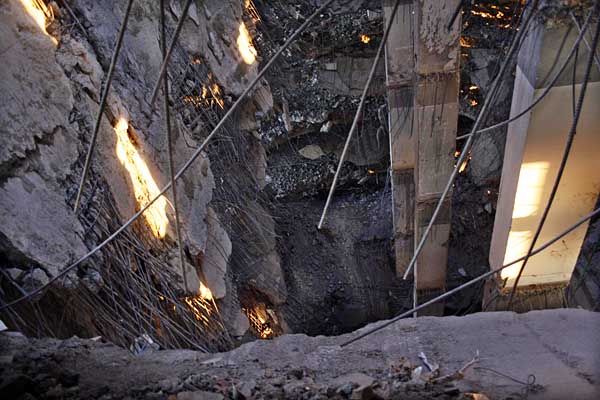 Collapsed floor of Rangs Building. December 9. 2007 ? Munir uz Zaman/DrikNews
Collapsed floor of Rangs Building. December 9. 2007 ? Munir uz Zaman/DrikNews
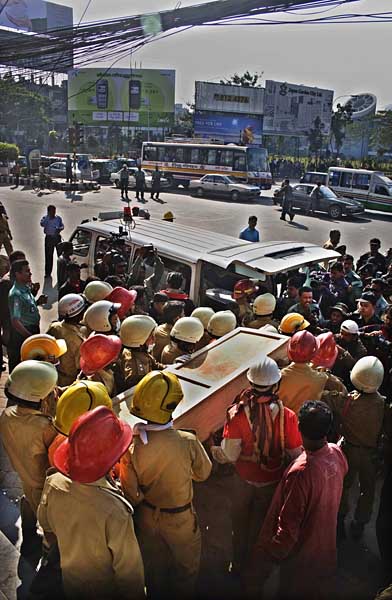 Body released by Fire Brigade being sent to morgue. ? Azizur Rahim Peu/DrikNews
Body released by Fire Brigade being sent to morgue. ? Azizur Rahim Peu/DrikNews
We rushed as soon as we received the tip off, sneaking away from our workshop on “Investigative Journalism for Television.” Working our way round the devotees praying on Panthapath we rushed to the National Museum.
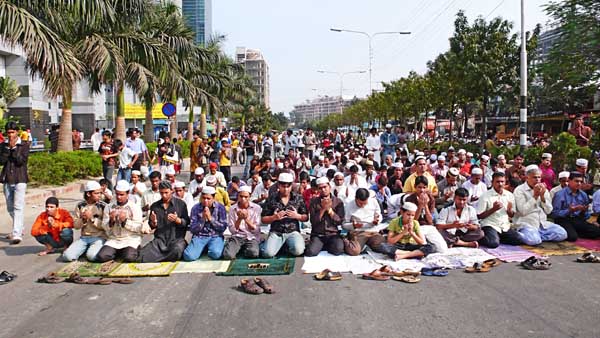 Jumma prayers on Panthapath. Friday December 7. 2007. ? Shahidul Alam/Drik/Majority World
Jumma prayers on Panthapath. Friday December 7. 2007. ? Shahidul Alam/Drik/Majority World
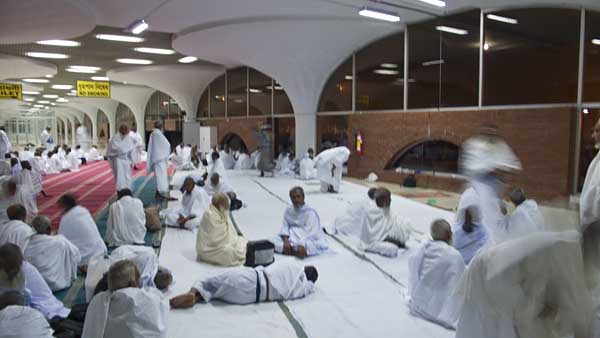 Hajis at Zia International Airport. Saturday December 8. 2007. ? Shahidul Alam/Drik/Majority World
Hajis at Zia International Airport. Saturday December 8. 2007. ? Shahidul Alam/Drik/Majority World
It was a false alarm. The trucks had left, and the artefacts that were still left in the National Museum were safe. At least for the moment. The remaining week, my book launch in Glasgow,
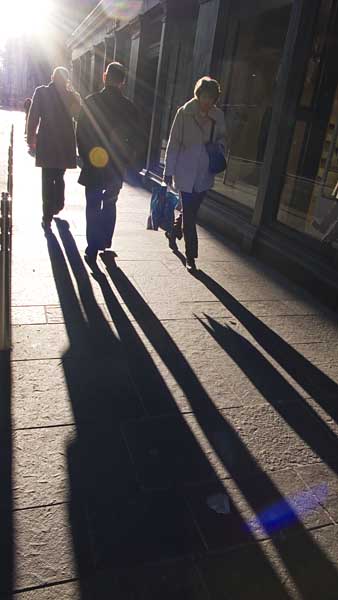 Glasgow. December 10 2007. ? Shahidul Alam/Drik/Majority World
Glasgow. December 10 2007. ? Shahidul Alam/Drik/Majority World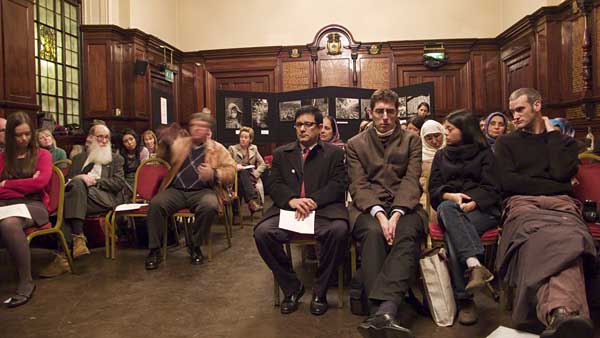 Glasgow. December 10 2007. ? Shahidul Alam/Drik/Majority World
Glasgow. December 10 2007. ? Shahidul Alam/Drik/Majority World
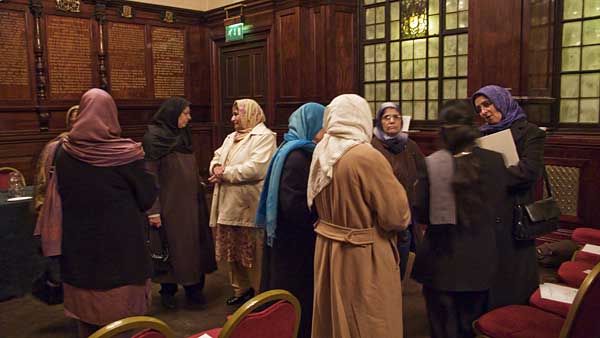 Glasgow. December 10 2007. ? Shahidul Alam/Drik/Majority World
Glasgow. December 10 2007. ? Shahidul Alam/Drik/Majority World
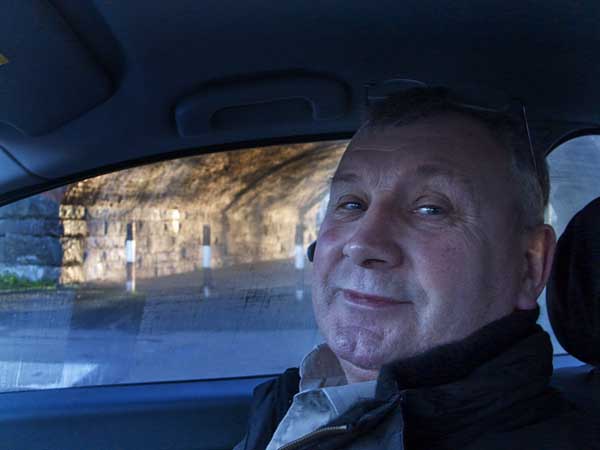 Taxi driver Robert who had worked at Port Glasgow. Ships later taken apart in Chittagong, Bangladesh, started their journey here. December 10 2007. ? Shahidul Alam/Drik/Majority World
Taxi driver Robert who had worked at Port Glasgow. Ships later taken apart in Chittagong, Bangladesh, started their journey here. December 10 2007. ? Shahidul Alam/Drik/Majority World
the Prince Claus Fund Award ceremony in Amsterdam and the conference “Visible Rights” at Harvard, took me from a sunny afternoon in Scotland to the snow covered streets of Cambridge.

Though Jon Husband had helped me setup my blog, I had never met him before. Jeroen picked me up at Schipol, and Jon, Jeroen and I had dinner at the Bazar Middle Eastern restaurant in Amsterdam. December 10. 2007. ? Shahidul Alam/Drik/Majority World
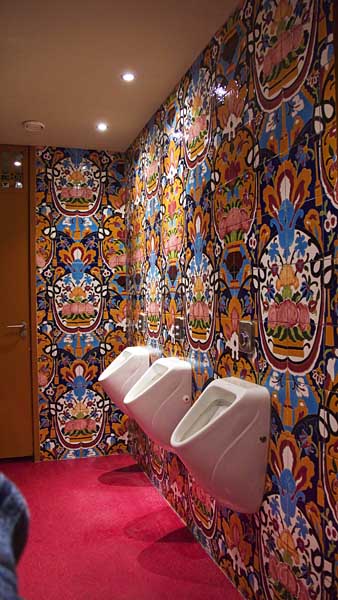 The ornate loo at the Bazar Middle Eastern restaurant in Amsterdam. December 10. 2007. ? Shahidul Alam/Drik/Majority World
The ornate loo at the Bazar Middle Eastern restaurant in Amsterdam. December 10. 2007. ? Shahidul Alam/Drik/Majority World
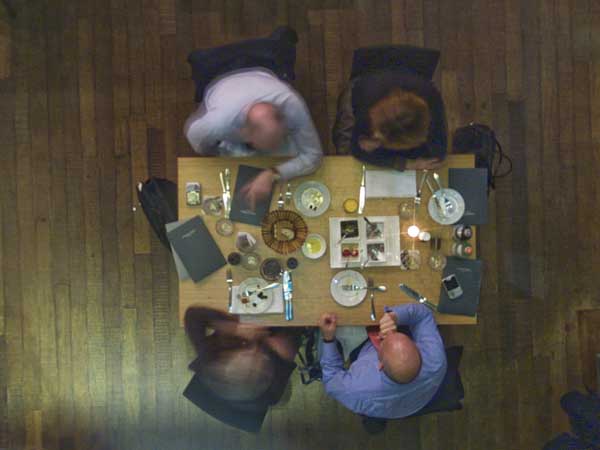 Diners seen through the glass floor at Muziekgebouw. Amsterdam. Dec 12. 2007. ? Shahidul Alam/Drik/Majority World
Diners seen through the glass floor at Muziekgebouw. Amsterdam. Dec 12. 2007. ? Shahidul Alam/Drik/Majority World
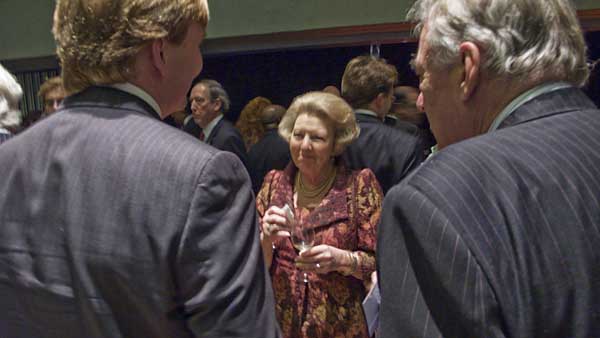 Queen Beatrix at Prince Claus Fund Award Ceremony at Muziekgebouw. Amsterdam. Dec 12. 2007. ? Shahidul Alam/Drik/Majority World
Queen Beatrix at Prince Claus Fund Award Ceremony at Muziekgebouw. Amsterdam. Dec 12. 2007. ? Shahidul Alam/Drik/Majority World
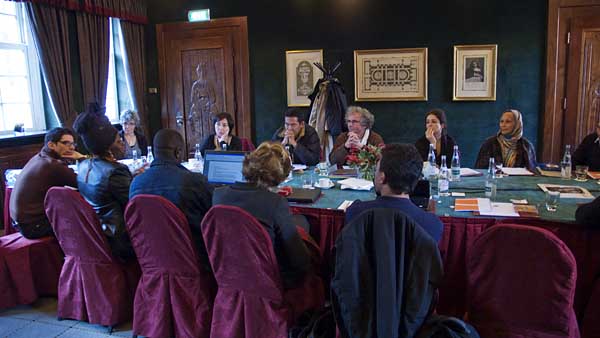 Network meeting of Prince Claus Fund at Grand Hotel, Amsterdam. December 13th 2007. ? Shahidul Alam/Drik/Majority World
Network meeting of Prince Claus Fund at Grand Hotel, Amsterdam. December 13th 2007. ? Shahidul Alam/Drik/Majority World
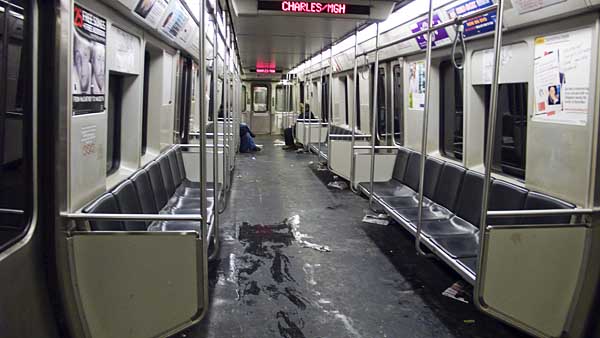 Train at Boston December 14. 2007. ? Shahidul Alam/Drik/Majority World
Train at Boston December 14. 2007. ? Shahidul Alam/Drik/Majority World
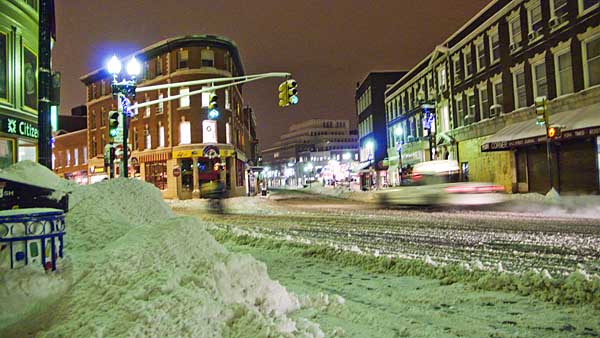 Outside Harvard train station at 2:00 am. December 14. 2007. ? Shahidul Alam/Drik/Majority World
Outside Harvard train station at 2:00 am. December 14. 2007. ? Shahidul Alam/Drik/Majority World
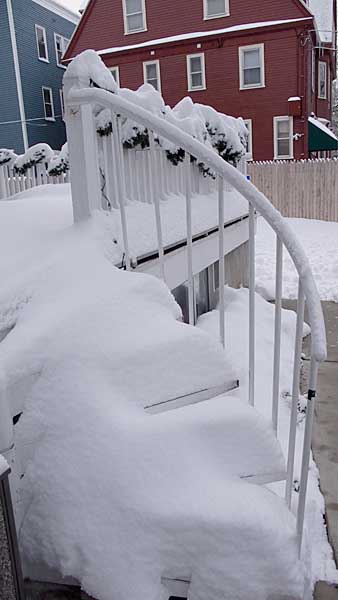 Stairs at Irving House. December 14. 2007. ? Shahidul Alam/Drik/Majority World
Stairs at Irving House. December 14. 2007. ? Shahidul Alam/Drik/Majority World
There was good news in between. The Rajshahi University teachers being released was a great relief, but the deaths of workers at Rangs Building, and the slum fire in Begunbari reminded me how far my own life was from the reality of workers and slum dwellers of my land.
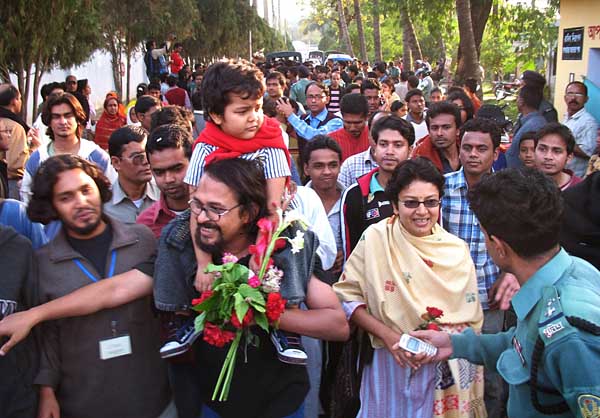 Detained Rajshahi University teachers, released after being granted a presidential pardon. December 10. 2007. ? Iqbal Ahmed/DrikNews
Detained Rajshahi University teachers, released after being granted a presidential pardon. December 10. 2007. ? Iqbal Ahmed/DrikNews
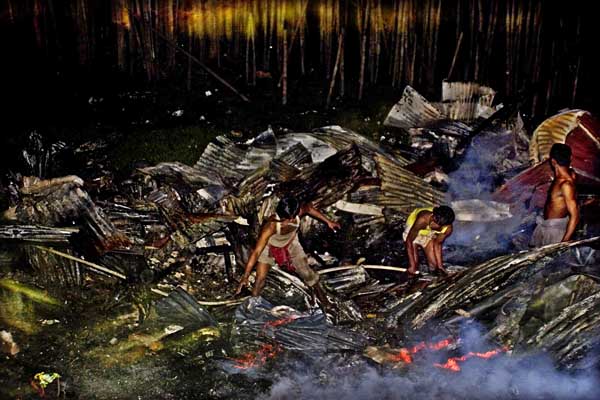 Fire in Begunbari slum. December 15. 2007. ? Zaid Islam/DrikNews
Fire in Begunbari slum. December 15. 2007. ? Zaid Islam/DrikNews
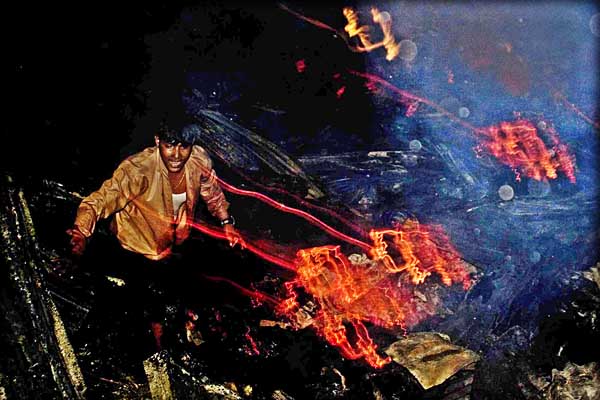 Fire in Begunbari slum. December 15. 2007. ? Zaid Islam/DrikNews
Fire in Begunbari slum. December 15. 2007. ? Zaid Islam/DrikNews
While the gatekeepers who rule our land remain untouched by the death of the poor. While media houses remain in the hands of wealthy business people. While opulent adverts by Grameen, Banglalink and Warid influence what gets reported in mainstream, the lives of media professionals like Priscilla Raj, Tipu Sultan, Probir Shikdar and Tasneem Khalil will continue to be under threat, The war criminals supporting the Pakistan Army had killed our intellectuals on the month of victory in 1971. December has another meaning for the workers and the slum dwellers who live under different military rulers.
Just Hand Me A Biri
![]()
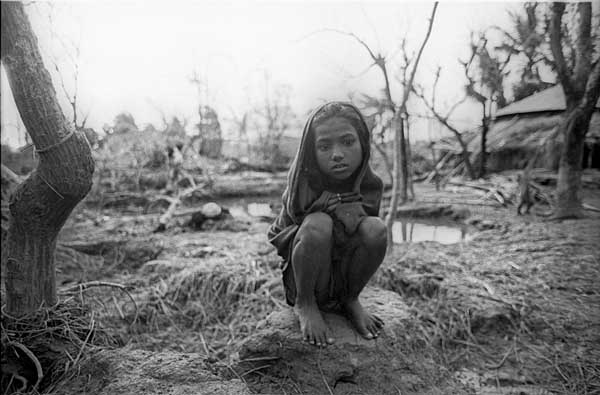
Orphaned girl by the remains of what was her home. Anwara. Bangladesh. 1991. ? Shahidul Alam/Drik/Majority World
“The dark cyclone shelter was packed with people, mostly women and children, some crying, some screaming. It was chaos. And then there was the loud knock. We struggled to open the door against the wind, The whole night sky tried to get in through the small gap we had made. The man pushed his way in as we struggled to lock the door again. He was a strong burly man, but he was shaking. “Give me a biri (hand rolled cigarette)” he said. I got angry. “Can’t you see what is happening here? What state people are in? And you want a biri?” He wasn’t harsh, but his stare was cold. “Agaro jon re puita aisi. Biri de.” (I’ve buried eleven. Just hand me a biri).”
This had been 1991. We had crossed into Hatia, and the ride across the choppy sea had left us all rattled. Slowly people spoke of their experiences on the night of the 29th April 1991, when the sea had become a wave.
This time I was stranded in Kathmandu when I received the news from Rahnuma. She was dreading the worst. The ticker tape on CNN said the storm was 100 kilometres from Dhaka, when I finally went to sleep in the early hours of the morning. This was the time of Internet and mobile phones, but the Net was down and the network was too congested to get calls through. Irfan managed to send a text the next day asking me to charge my mobile. Dhaka had no electricity.
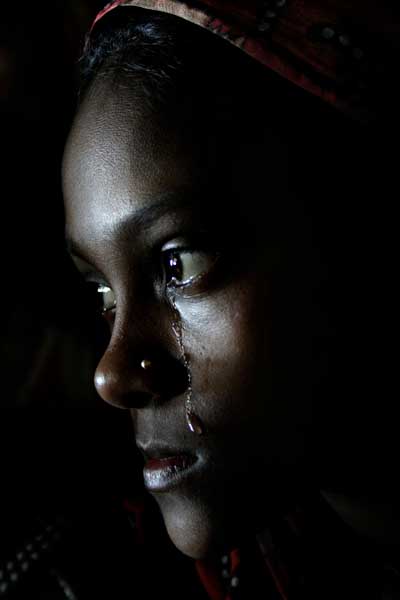
Cyclone SIDR. Dublar Char, Bagerhat, Bangladesh. November 26 2007. ? Asad/DrikNews
Joshim was waiting as usual at the airport. At least there was electricity there. Some of the street lamps were lit. I managed to make it home in the early hours of the morning. Most of Dhaka was then in darkness. We did have electricity in the flat, but it soon went. Ragni and Nunni (two of our many children) were both fast asleep. Ragni went off this morning to an FK meeting, an exchange partnership we are involved in. The Net is up again, at least partially. Nipun is designing the majority world flyer. Life goes on. We don’t yet know the extent of the damage, but the figures are undoubtedly high. We are fine. Many others sadly are not.
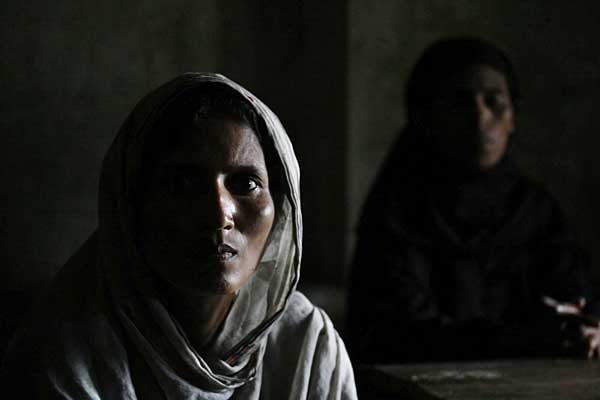
Women in a cyclone shelter centre at Coxbazar, Bangladesh. Cyclone SIDR. November 16 2007. ? Munir uz Zaman/DrikNews
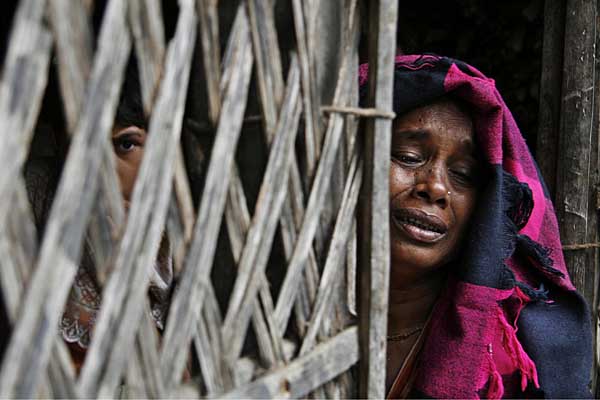
A woman weeps for her lost relatives. Cyclone SIDR. Khulna. Bangladesh. 17th November 2007. ? Tanvir Ahmed/DrikNews
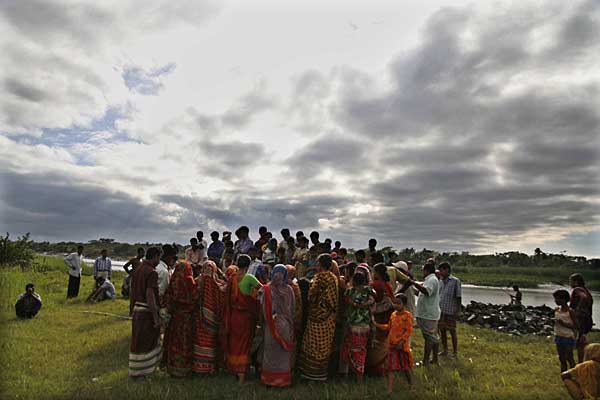
Relatives and neighbours bury their dead by the Rupsha River. Cyclone SIDR. Khulna. Bangladesh. 17th November 2007. ? Tanvir Ahmed/DrikNews
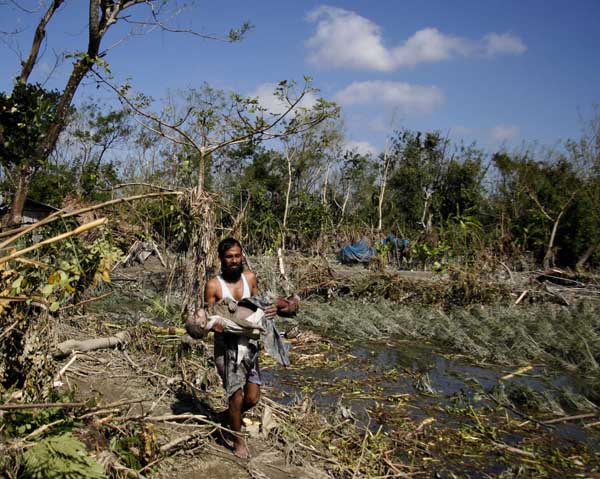
A man carries his grandchild?s dead body from debris of the house. Cyclone SIDR. Shoronkhola, Bagerhat, Bangladesh. November 19 2007. ? Tanvir Ahmed/DrikNews
My bike was at Drik, so I took a rickshaw to the office. The rickshawalla’s name was Shah Alam. Our similar names added to our camaraderie. He was from Bhola. They had lost twelve. “But I have a mobile” he said sheepishly. Almost apologising for this perceived opulence. “At least this way I can talk to my parents.”
Abir and Munir are already out there. Jessica is preparing to leave for Patuakhali. In 1991, I had rushed back from Feni and managed to bluff my way into a military helicopter to do a story with Barbara Crossette for the New York Times. Sending the picture through the old fax transmitter in the T&T office took hours. With most connections down, we had struggled to get the picture through. And then I was out again. It was only when I met James Nachtwey in Chittagong that I found out that my picture had made the front page of the Herald Tribune. Now as I sit behind a computer screen typing text and booking tomorrow’s flight to Sri Lanka, other photographers are headed for the coastline.
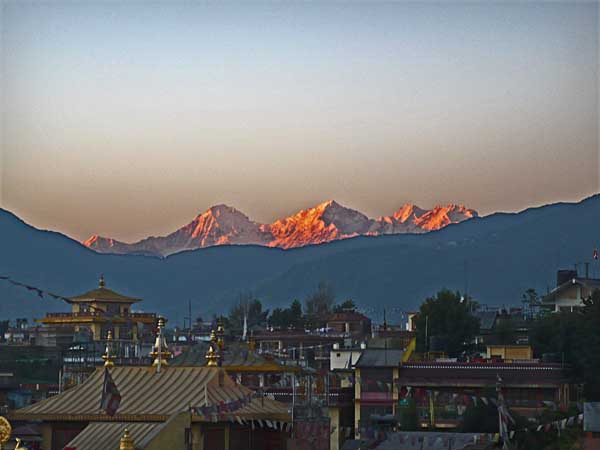
Sunset on the outskirts of Kathmandu. Nepal. 16th November 2007. ? Shahidul Alam/Drik/Majority World
Last night as we waited for yet another hugely delayed GMG flight, Nayantara took Tutul and I to catch the last glimpse of sunlight in the mountains outside Kathmandu. The chanting of the priests, and the gentle bells from the stupa below made Dhaka seem far away. We even stopped to give an interview on CJMC’s new FM station. Back home Bazlu bhai and his team have been pushing for permission for community radio for years. A much needed tool in times of crisis. The airwaves here have been reserved for propaganda. A once outspoken media sings the glory of the military and the untiring efforts of the government. Some with reluctance.
Saving people’s lives seems a far lesser priority.
——
Find link for interview on Radio France Internationale (streaming)
Afsan Chowdhury’s interview on climate change in Bangladesh
or download file: sa-2nd-clip-from-french-radio-on-cyclone.mp3
article-on-natures-fury.pdf (from the Book: Communicating Disasters, by TVEAP and UNDP)
Bangladesh Now
![]()
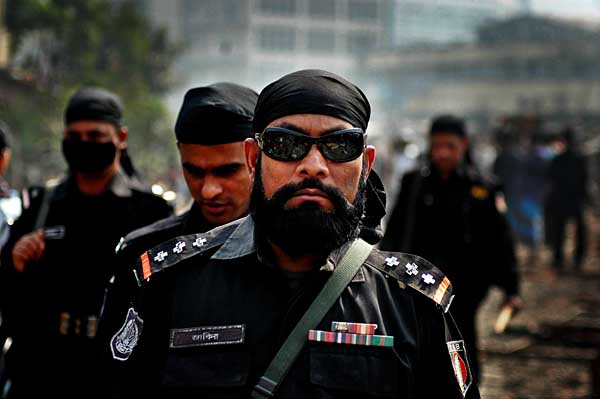
The Rapid Action Battalion (RAB) were setup as a crack team to support law enforcement. Numerous accusations of extra judicial killings have been attributed to RAB, usually followed by a government press release about people having died in a ‘crossfire’. ? Munem Wasif/DrikNews
Dark glasses, black bandana, arrogance in his face. ‘The Protector’ strides with purpose. A new word enters our lexicon. You can now ‘crossfire’ a person. No questions asked.
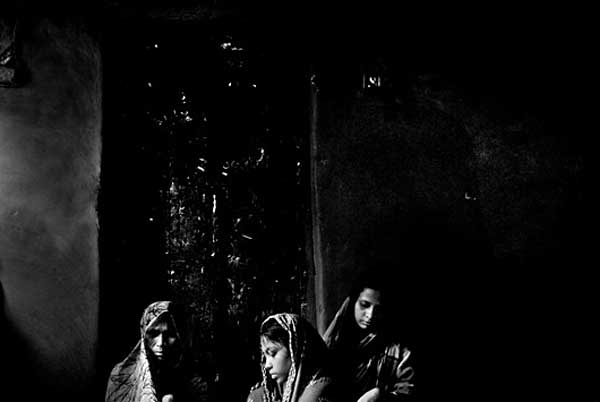
Hanif, a mill worker, was shot dead by the police during a protest rally organised by the workers. Two hundred workers were injured. Crescent jute mill, Khalishpur, Khulna, 11 September 2006. ? Munem Wasif/DrikNews
She mourns in silence. Her man, a worker in a mill, is no more. His crime? Demanding payment for his labour.
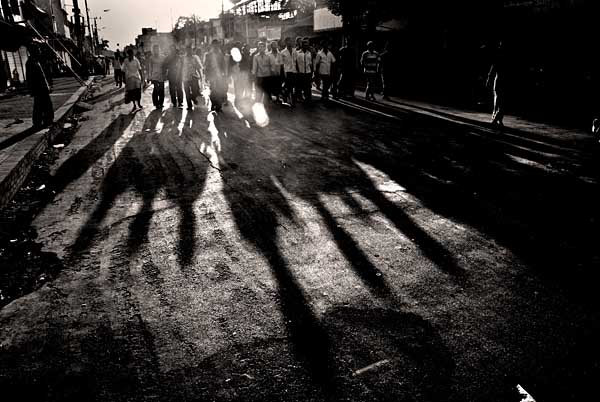
Workers protest on the streets of Khalishpur, even during emergency. ? Munem Wasif/DrikNews
A child screams.
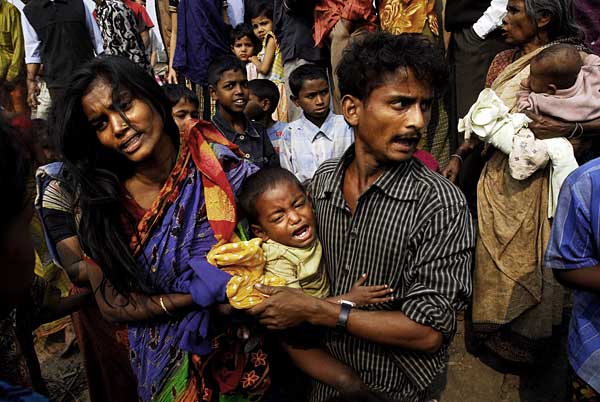
Soon after coming to power, the caretaker government ordered all illegal constructions and slums be torn down. Those affected do not know where to find shelter since laws and their interpretations are mostly anti-poor. Dhaka Bangladesh. 24 January 2007. ? Munem Wasif/DrikNews
Evicted from a slum that offered little, his parents in search for even less.
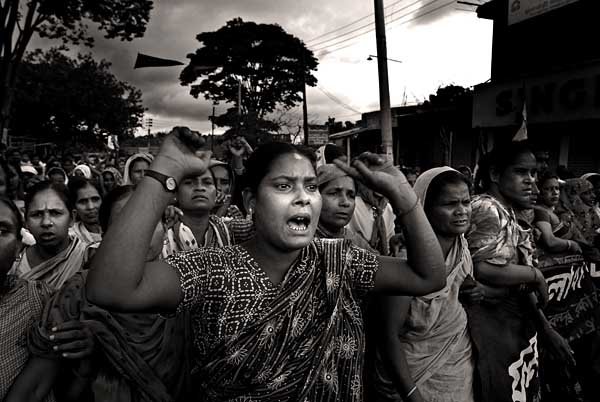
Muslim and Adivasi women unite in their fight against multinationals. Phulbari Bangladesh. 30 September 2006. ? Munem Wasif/DrikNews
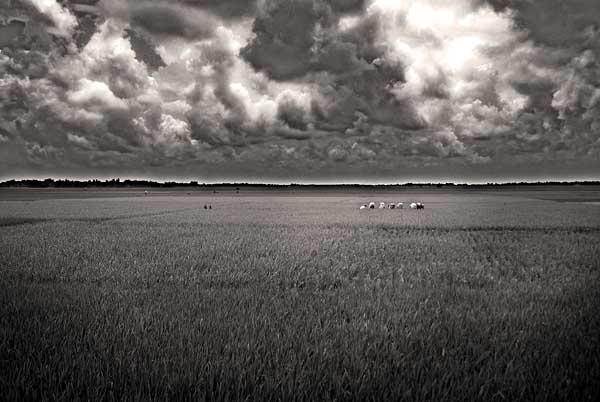
These green fields will disappear if coal mining starts. Phulbari Bangladesh. ? Munem Wasif/DrikNews
Angry women protest the illegal hand-over of their land to multinationals.
————————————-
Choles Ritchil killed in custody
————————————-
And the missing photograph. The one we cannot show. The one of the Adivashi leader tortured and killed in custody. He too had the temerity to resist government takeover of his ancestral land.
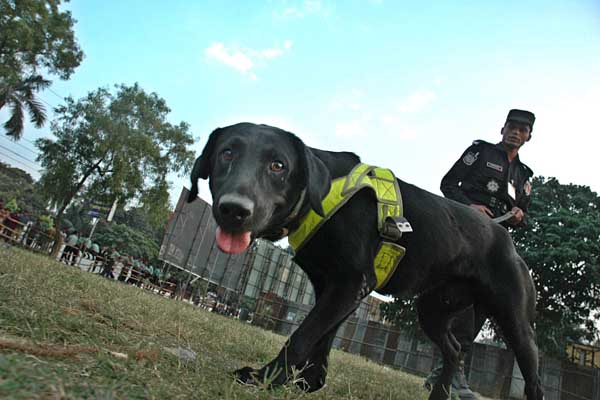
A member of Rapid Action Battalion (RAB, Bangladesh’s elite security force), checks the grounds with a dog squad to ensure security of the 14 party led Awami League’s grand rally the next day. Paltan, Dhaka Bangladesh. December 17 2006.
? Munir uz Zaman/DrikNews
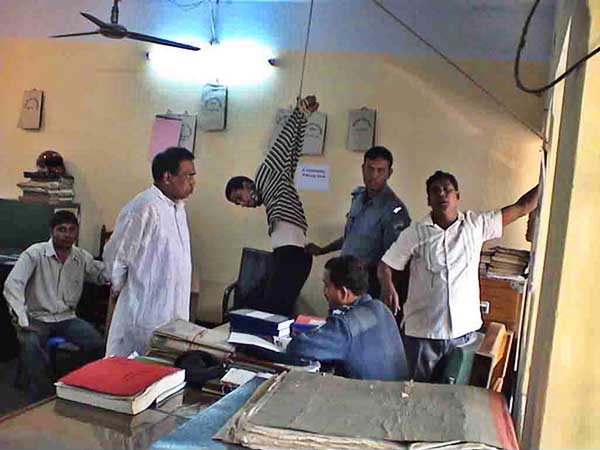
Ratan Kumar, suspected of stealing a gold necklace, was tortured at Bogra Police Station. This photograph (taken with a mobile phone) was published in a daily newspaper, resulted in police officials seen in the picture (the officer-in-charge, three sub-inspectors and a constable) being suspended from active duty. Bogra Bangladesh. 28 January 2007. ? DrikNews

Police fired tear gas shells and rubber bullets to stop agitated students at Dhaka University campus. As protests engulfed the nation, curfew was declared in 6 divisional cities from 8 at night. A student hurls back a tear gas shell. Dhaka Bangladesh. 22 August 2007.? Azizur Rahim Peu/DrikNews
Now is a difficult time. A time for reflection, a time for retrospection, a time for defiance. Sadly for most Bangladeshis, now has always been difficult. Apart from the brief euphoria after independence in ’71, there were the lesser joys when the autocrat left in ’90, on winning a Nobel peace prize in ’06 and even temporary relief when emergency was declared in January ’07. But those feelings have been short-lived. Particularly for the poor. When elephants clash it is the grass that gets hurt.
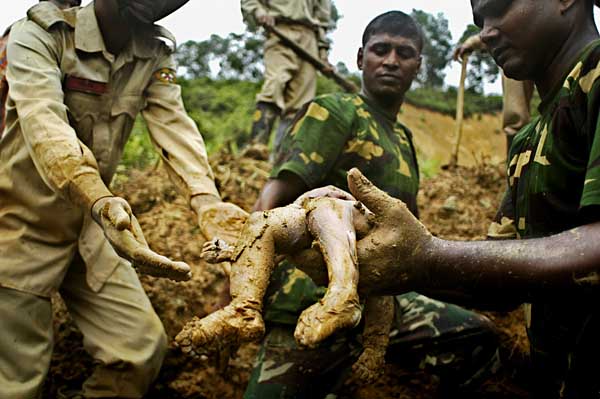
Soldiers and rescue workers recover a child’s body from landslides caused by heavy rains on the deforested hills of Chittagong city. One hundred and six people died, many more were injured. Chittagong Bangladesh. 12 June 2007. ? Tanvir Ahmed/DrikNews
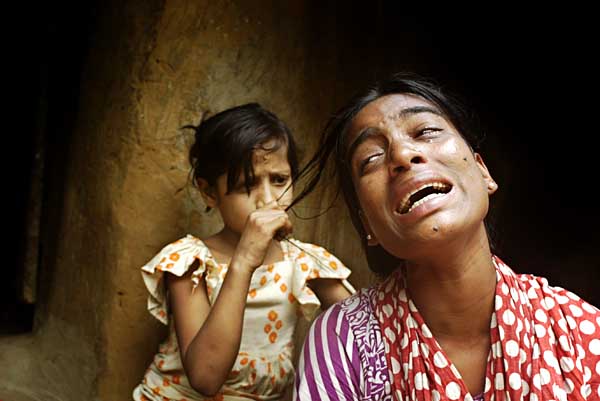
A woman mourns the death of her family members, all of whom died as a result of the mudslide. Chittagong Bangladesh. 12 June 2007. ? Tanvir Ahmed/DrikNews
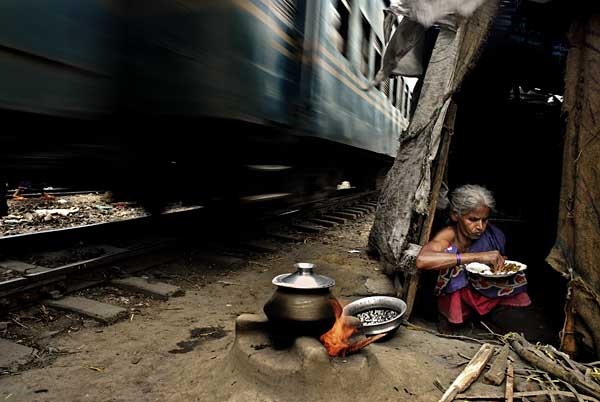
Life is fearful for a slum-dweller. When will she face the next eviction? Dhaka Bangladesh ? Munem Wasif/DrikNews
Arrests in the night, the brutality of high prices and the daily grind of poverty are the realities that wear people down. But they are warriors. Despite the weight of unjust governance, despite the price they always end up paying, they still protest. And the photojournalists? When justice is compromised. When the poor are trampled under the march of ‘reform’. When fear evokes silence. When familiar faces turn away. To stay ‘neutral’ is to stay aloof. They stand on the side of the oppressed. Unashamedly so.
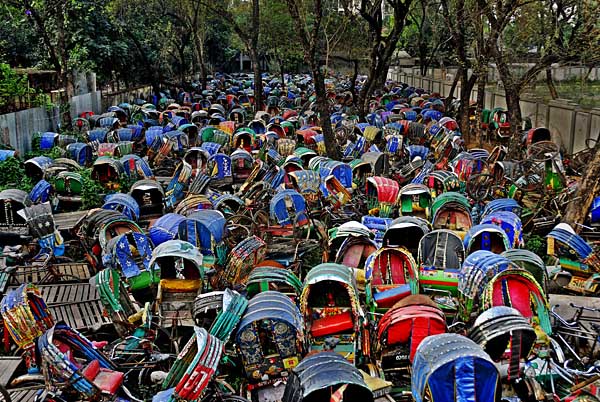
Rickshaws without proper licenses seized by police and dumped near Police Control room. Rickshaws are environment-friendly and affordable by the middle class and often the only source of paid work for men migrating from villages in search of work. 17 February 2007. Dhaka Bangladesh. ? Munem Wasif/DrikNews
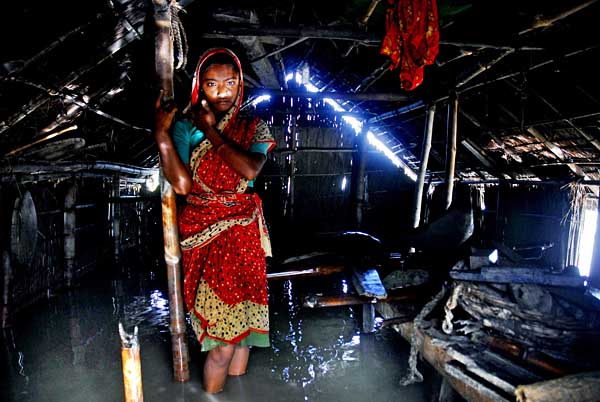
A village woman dries dhan (husked rice grain) as flood waters recede. Chilmari, Rangpur. August 8 2007. A village woman dries dhan (husked rice grain) as flood waters recede. Chilmari, Rangpur. August 8 2007. ? Munem Wasif/DrikNews
On Tuesday the 4th of September 2007 DrikNews will hold its inaugural photographic exhibition “Bangladesh Now”. The photographs shown are a selection from the exhibition.
The exhibition will be opened by Nurul Kabir, editor, New Age, who will share his views about the current situation in Bangladesh,
before the opening. The program starts at 5.00 pm.
Drik will be 18 years old on that day. We’d like you to be with us
The Barren Banana Tree
![]()
Singapore Airlines warned of “protests by university students developing in Dhaka” as we boarded the plane. But emails from Delower and Rahnuma during the brief stopover in Singapore talked of the curfew in place in the six main cities. This was no longer a small skirmish in Dhaka University. Joshim was going to be at the airport with my accreditation card and we would try and find a way back home.

Students at Dhaka University under teargas attack, throwing bricks at police. 22 August 2007. Dhaka Bangladesh ? Munir uz Zaman/DrikNews
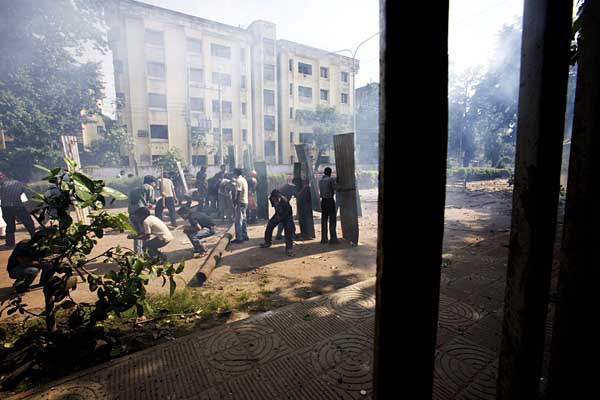
Students at Dhaka University shielding themselves with sheets of tin, during fights with police. Photographer anonymous.
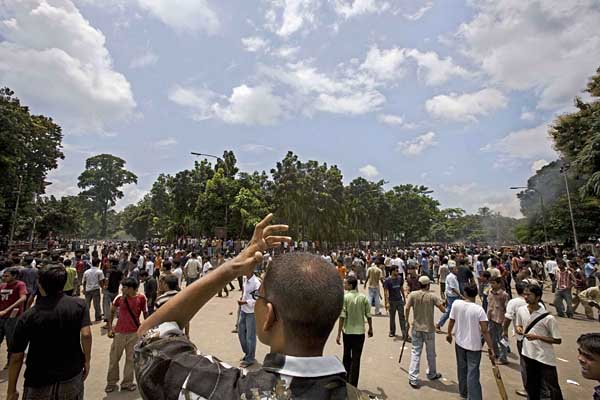
Protesting students gather at Dhaka University campus during violent clashes with police. Photographer anonymous.
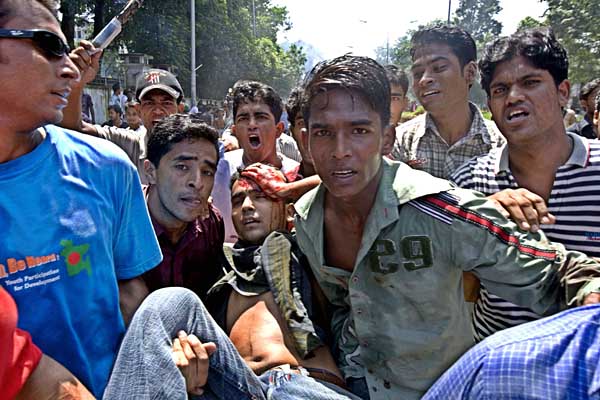
Student hit by police shotgun bullet being carried away by fellow students. Photographer anonymous.
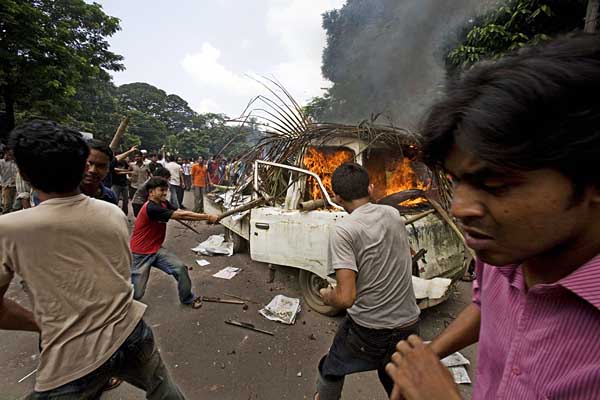
Enraged students burn a car at the Teacher’s Student’s Centre (TSC). Photographer anonymous.
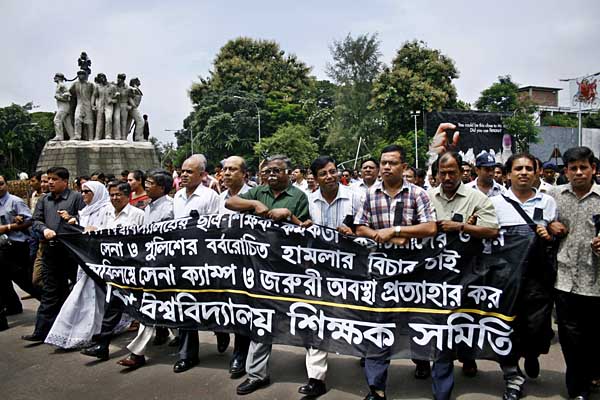
Members of Dhaka University Teacher’s Association protesting against the attacks on campus by police and army, and demanding withdrawal of the state of emergency. Two of the teachers in the front row have since been arrested. 22 August 2007. Dhaka Bangladesh ? Munir uz Zaman/DrikNews
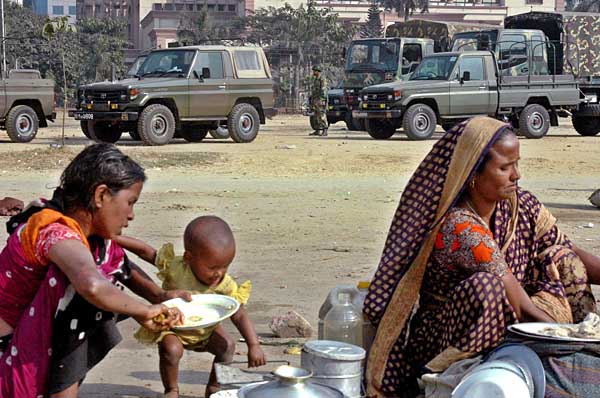
Rocketing prices of essentials create extreme distress for people with low earnings, like the people pictured in the foreground. The military of Bangladesh, which has not had to fight since the birth of the nation in 1971, has in the meanwhile, had increasing budgetary allocations in each successive regime. Numerous allegations about corruption in military purchase, has gone uninvestigated. 22 August 2007. Dhaka Bangladesh ? Munir uz Zaman/DrikNews
The government had taken all mobile networks off the air. With only official press releases for information, the person in the street was in for a rough time. It was easy to find Joshim in the empty car park. Only the occasional long distance truck plied VIP road. I put the video camera on record mode, but relied on my less conspicuous LUMIX to photograph the empty streets. Though I stopped on the Mohakhali flyover to take pictures, I was nervous when the RAB vehicles passed below. There was never a good time for being arrested, but this was as wrong a time as it could get.
Aaasteeey! The policeman strode over lazily. Ki bapar? I did have my card dangling from my neck, and from previous experience, used my confident, ‘I belong here’ approach. That usually worked best with low tier security people.
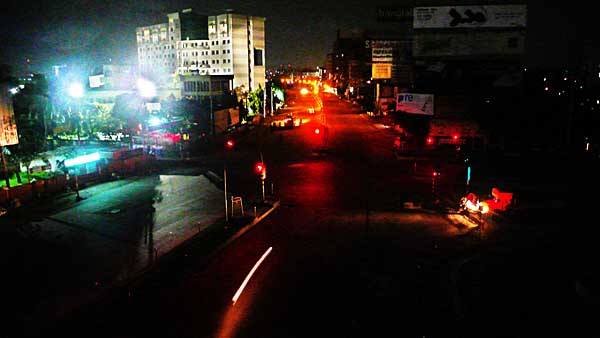
The Mohakhali Junction, one of Dhaka’s busiest traffic spots, is empty on the night of the 22nd August, when the government called an indefinite curfew. Dhaka Bangladesh. ? Shahidul Alam/Drik/MajorityWorld
I’d stopped to take pictures by the near-empty Tejgaon rail station. Stepping carefully through the people sleeping on the floor, I came up to Shahjahan and Neela. Unaware of the curfew, they had brought their sick child Shamim from Tangail, but got stranded in Tejgaon. There was no food, no doctor, no place to sleep, no way of knowing how long this would go on. Each visit to the toilet cost 5 Taka.
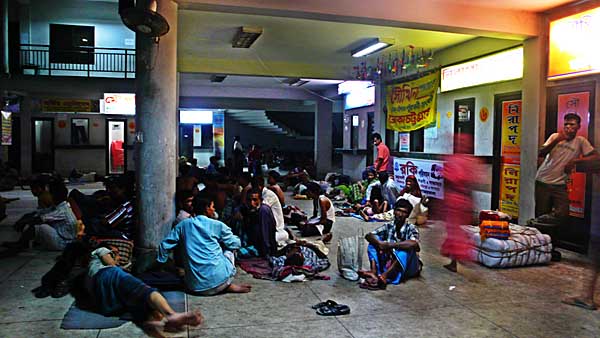
Stranded passengers at Tejgaon Railway Station, sleep on the floor. 22 August 2007. Dhaka Bangladesh. ? Shahidul Alam/Drik/MajorityWorld
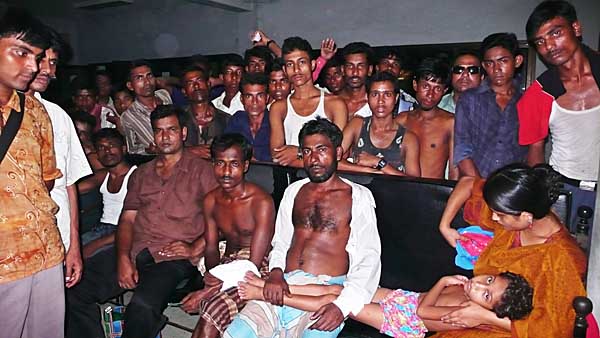
Shahjahan and Neela tend to their sick child Shamim, whom they had brought to Dhaka for treatment. Along with other stranded passengers at Tejgaon Railway Station, the family had no food or drink, or a place to sleep. 22 August 2007. Dhaka Bangladesh. ? Shahidul Alam/Drik/MajorityWorld
The next checkpost was slightly more hostile, but the expired accreditation card dangling from my neck was working overtime. We passed without much harassment. Dropping Joshim home, I went past the Shonar Bangla Market in Karwan Bazaar. The busy market place had a haunted look. No cackle of chickens, haggling for prices, or calls from vendors. Just one man counting loose change.
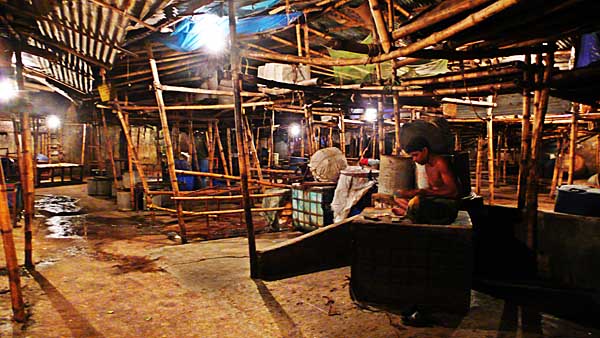
Shonar Bangla Market at Karwan Bazaar is one of the busiest market places in Dhaka. The shops are empty on the night of 22nd August 2007. Dhaka Bangladesh. ? Shahidul Alam/Drik/MajorityWorld
The brightly lit Square Hospital in Panthapath stood out in the dark. Government orders to turn down the lights after dusk to save electricity was presumably for commoners only. The street was empty, but this time as I approached with my camera police converged from all directions. I fumbled a bit, but recovered in time to get one shot. This was not the time to look for best angles. Rattling off important sounding words like ministry of information, and dropping the occasional names I could think of, I got into the car and drove off before the uniformed men had gathered their wits. A government adviser’s business interests in Square Pharmaceuticals – while undeclared – was well known. Students had already attacked the building the previous day. The approaching police knew whose business interests to protect.
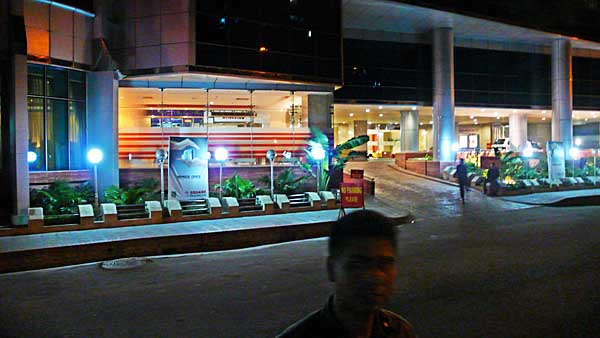
The Square Group, one of the wealthiest business enterprises in Bangladesh owns the Square Hospital. Government regulations prohibit the excess use of electricity and non-essential shops are required to close by 8 pm. Several people were killed by the police when they came out in protest, demanding adequate electricity. The Square Group is owned by the family of one of the advisers of the caretaker government. 22 August 2007. Dhaka Bangladesh. ? Shahidul Alam/Drik/MajorityWorld
The road through Dhanmondi was eerie. The women who walked the streets near Abahani playground were nowhere to be seen. Like the many others who struggled to make a living, they too would not be earning tonight.
The junction near ULAB was scarred by burnt tyres. The convoy of police vans deterred me from getting my camera out and I turned into road 4A. It was time to go home. Kamaler Ma, Joigun, Zohra and Rahnuma were all up waiting. With the mobile network off, they didn’t have any news about me. There must have been others in many more homes who were up worrying.
Rahnuma and I talked of the events over the last two days, of the army camp in Dhaka University. Of a soldier slapping a student. Of the vice chancellor (acting) being beaten up by police. This had never happened before, not even during the Ayub or Ershad military regimes. The reference to ‘evil doers’ in the chief adviser’s speech to the nation was worryingly close to the ‘axis of evil’. Independent media channels were then still defiant. That night the information adviser advised the media to practice ‘self censorship’.
Despite their claims, this government had never been called in by the people. We had no say in who the advisers would be. It was not military rule the people had welcomed, but the cessation of violence and the fear of further anarchy if the rigged elections were held. Banana trees would have made equally good replacements. However, banana trees would not have sold national interests. Closed down environmentally-friendly jute mills. Made slum dwellers homeless, or tortured and killed adibashis protesting the military acquisition of their ancestral lands. So while there was initial relief, as the price of essentials soared, news of nepotism and the partisan manner in which Jamaat -e-Islami was being shielded soon made people realise this banana tree would never bear fruit, let alone run a government.
Warrantless arrests by plainsclothes army under the cover of curfew. Dissenting teachers picked up in the middle of the night. Making threats to independent channels ETV and CSB are hardly the character of a saviour government pledged to the return of democracy. As the behind-the-scene military decides it will now take centre stage. As Bangladeshis realise that a democratically elected autocratic government has simply been replaced by an unelected autocratic one, the tune in the streets is changing.
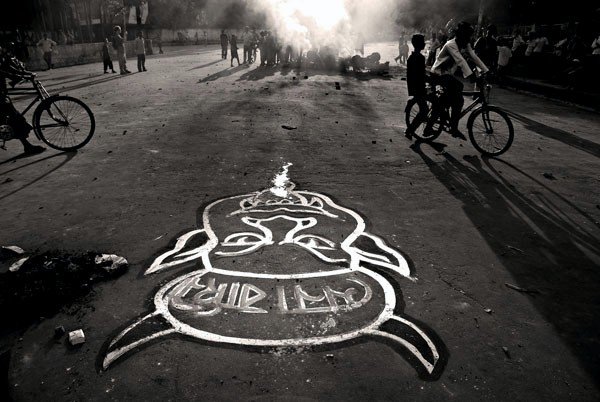
Symbols of fascist oppression drawn on university road. 21st August 2007. Dhaka Bangladesh ? Munem Wasif/DrikNews
Multiple demands of students and teachers have been whittled down to one – withdraw emergency rule. Underground pamphlets are spreading like wildfire. With the Internet down, text messages are filling up the ether. The information adviser’s suave statements to the media faltered as he snapped, “why such a fuss about a slap or two?”
****
The photograph that was being shown here has been removed on the request of the photographer
****
“In unprecedented scenes, soldiers in uniform were seen being chased out of the Dhaka university campus by students. In two days, the myth of the army’s omnipotence was all but laid to rest.” BBC. Photographer Anonymous.
The US has declared support for the chief adviser’s statement. What he lacks is the support of the people.
When the Waters Came
![]()
It was nearly twenty years ago when I had written this. After one of my first photojournalistic assignments:
What does one photograph to depict a flood? A submerged house, a boat on a highway, people wading in water?
As we boated through the branches in Jinjira we found a wicker basket in a tree. The family had long since abandoned their home, and their worldly belongings, gathered in that basket, waited patiently for their homecoming.

Wicker basket in tree. Jinjira. 2nd September 1988. Dhaka Bangladesh. ? Shahidul Alam/Drik/MajorityWorld
The worst flood in a hundred years? That statistic is hardly relevant. They, as those before them and after them will always face the floods. How does it matter whether they are 60% starved or 75% starved? How does it matter what country the relief wheat comes from? They themselves are mere statistics to power hungry politicians.

The family still needed to be fed. When I went back the next day to this place in Jinjira, the water had risen another three feet. I never saw her again. 2nd September 1988. Dhaka Bangladesh. ? Shahidul Alam/Drik/MajorityWorld
What is relevant are the feelings that have been kindled, that half kilogram of rice that has been shared, that solitary dry house that has warmly welcomed all who have needed the shelter. That others have shared the pain.
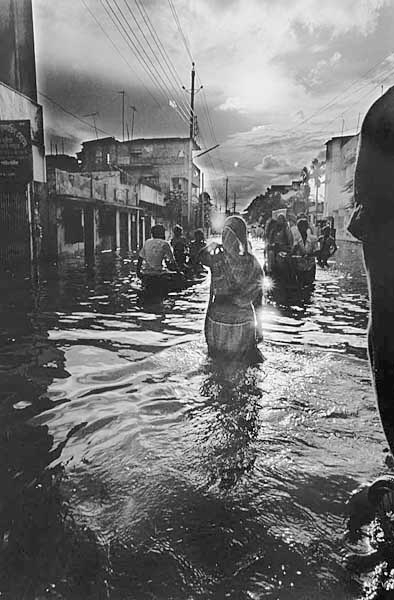
Wading down a street near Kamlapur railway station. “Dreamland Photographers”, the local studio, was still open for business. 2nd September 1988. Dhaka Bangladesh. ? Shahidul Alam/Drik/MajorityWorld
What is relevant is that now the roads are dry and the walls repainted and that a nation that once so cared has so quickly forgotten.
I look back and merely feel the ineffectuality of my images.
Shahidul Alam
Dhaka 1988
Nearly twenty years on, the floods are with us again. They are a part of our natural agricultural cycle. They irrigate the land, replenish the topsoil, remove the toxins. But deforestation in the mountains, illegal constructions, ill planned roads and ill caring leaders make floods take on a violent form. The waters get angry.
This year, when the waters had risen, our adviser advised that it was not yet a calamity. When the waters reached danger levels, the decree came that because of the state of emergency, ‘[political] banners were banned’ so while people struggled for food and shelter, banner rights became the issue. Now as the waters engulf the land and people flounder in need of relief, our adviser advises us ?we don?t have to help the people, they?re going to their relative?s house by themselves?.
Now that is a solution Bangladesh can offer to all the distressed people in the world. Just go find a relative.
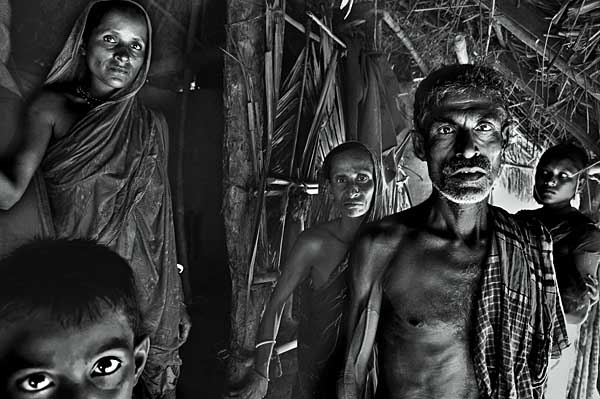
Before the floods. People affected by cyclone Akash. Mohishshoiri River. Khulna. 21 May 2007. ? Tanvir Ahmed/DrikNews
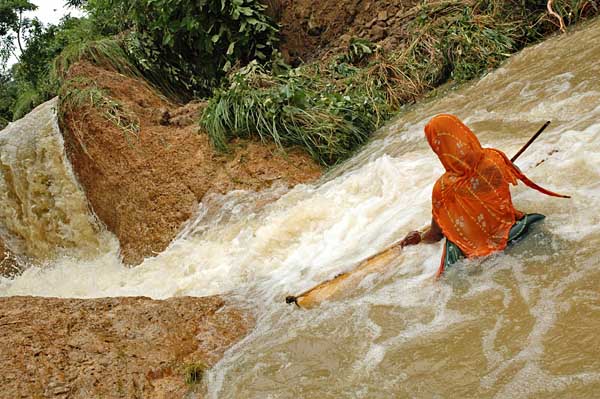
Woman fishes in the flood waters. 13 June 2007. Comilla Bangladesh. Kalim Shantu/DrikNews
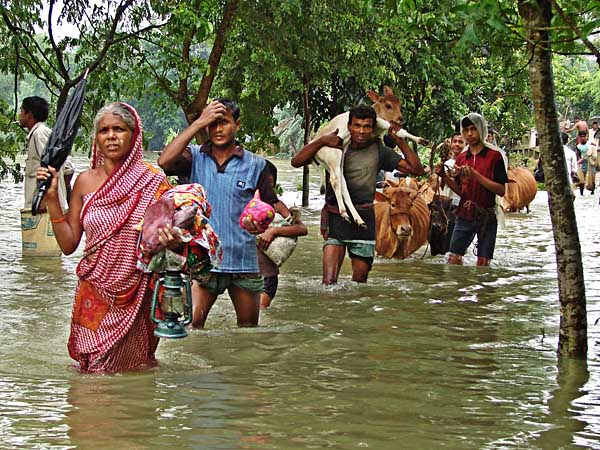
Twenty villages had been affected at the junction of the rivers Ghagot, Brahmaputra and Teesta making numerous people homeless. 31 July 2007. Gaibandha. Bangladesh ? Quddus Alam/DrikNews
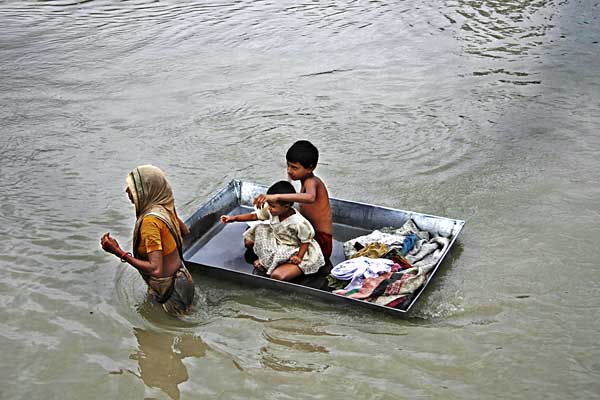
Woman in search of dry land. 30 July 2007. Sirajgonj Bangladesh ? Tanvir Ahmed/DrikNews
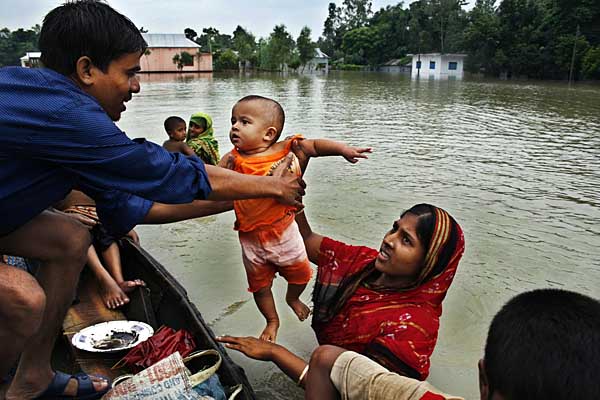
Villagers rescuing mother and child. 30 July 2007. Sirajgonj Bangladesh ? Tanvir Ahmed/DrikNews
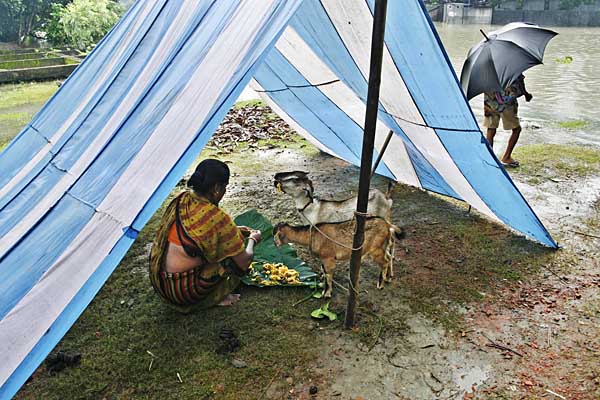
Woman feeding goats in makeshift tent. 30 July 2007. Sirajgonj Bangladesh ? Tanvir Ahmed/DrikNews
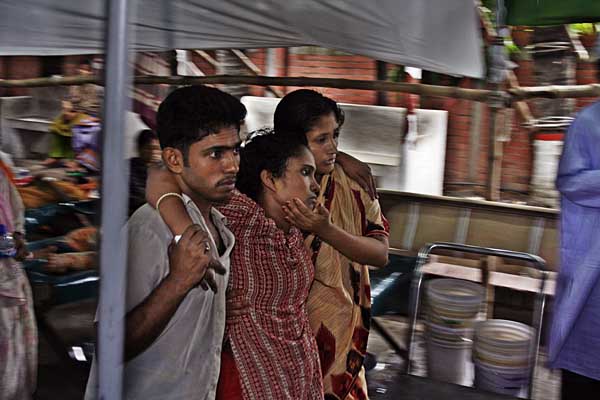
Diarrheal patients at hospital in Dhaka. 11 August 2007. Dhaka Bangladesh ? Munir uz Zaman/DrikNews
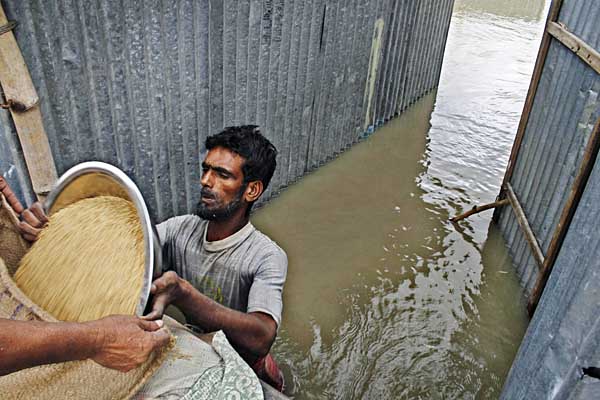
Spontaneous relief operations organised by citizen groups. 30 July 2007. Sirajgonj Bangladesh ? Tanvir Ahmed/DrikNews
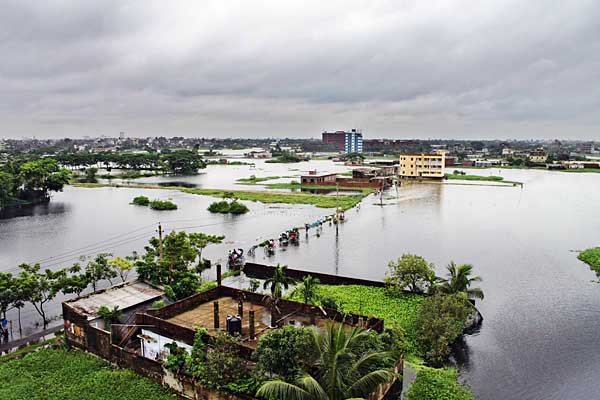
While one third of the country was flooded, people inside the DND (Dhaka Narayanganj Demra) embankment faced the stagnant water cause by rains. 25 July. Narayanganj Bangladesh ? Tanvir Ahmed/DrikNews
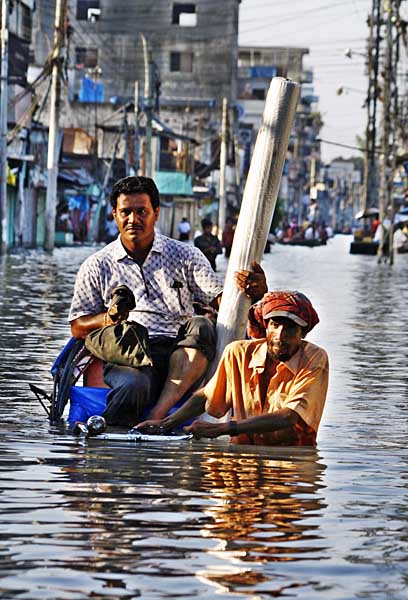
700,000 people were marooned in Sirajgonj. 64 people had already died when this photograph was taken. 5 August 2007. Sirajgonj Bangladesh ? Tanvir Ahmed/DrikNews
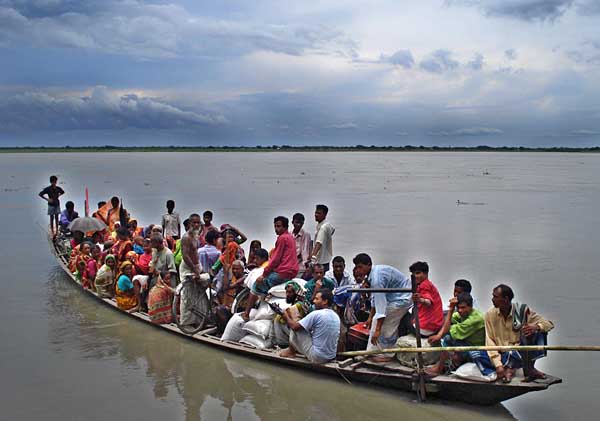
Boats are the only means of communication during floods. July 2 2007. Rangpur, Bangladesh. ? Ador Rahman/DrikNews
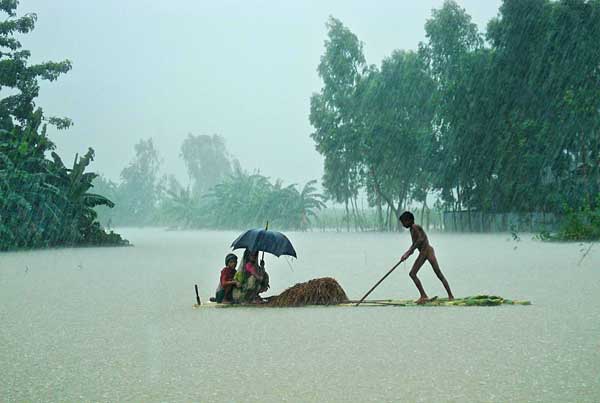
A family looks for shelter using a raft made of banana trees. 31 July 2007. Gaibandha Bangladesh ? Quddus Alam/DrikNews
And across the border, viewed from afar:
The Rains Reach Kolkata
When I was just a little boy, I watched the clouds advance
From rooftop high above the streets and bustle of Calcutta.
Up there, I watched the hawks soar high, and saw the palm fronds’ dance,
In wind that blew before the storm, and banged each window shutter.
It was in June, when summer’s heat had risen to its height,
That clouds approached, as though for war, advancing in a line,
Their heads held high, dark wall beneath — a fear-instilling sight,
With lightning streaks, and thunder-growls of warriors divine.
The sparrows, crows and pigeons fled, in haste to get away
And find refuge, as dust was blown from streets by gusts so strong
That palm trees bent, and tossed their heads, and back and forth did sway,
As leaves and clothes, and sailing fronds, with birds were swept along.
Then from the heat, we knew respite, as cool winds did descend
>From belly of the thunderhead, which bore a mist so fine,
With ions, whose electric charge did minds and bodies mend
And lift from summer somnolence like clear celestial wine.
And I would run and scramble down, from perch on highest roof,
To shelter in a doorway, where I still could watch the storm
Without myself being blown away, or struck by lightning hoof,
As racing clouds obscured the sky, like wraiths in equine form.
And then the dark, the greenish gloom, the flash more bright than sun,
The crack so loud it seemed the earth was cloven by the sky,
And pelting rain in slanting sheets, like bullets from a gun,
On roofs of tin, and wooden shades, and roll of thunder high!
And so the chariots of the gods would roll by overhead,
And we could hear the neighs and roars, and see the sparks that flew
As titans battled in the skies, by trumpet blowers led,
And sword of land pierced mail of sea, and blood of rain then drew.
And all the kids would venture out, unheeding of the scolds,
To jump with glee and leap and splash, in dance as old as time,
And yet as freshly bold that day, as in the eons old,
When sea would come to land to fight, and mate, in yearly rhyme.
Babui / Arjun Janah*
2007 August 11th, Sat.
Berkeley, California
*Arjun has an identity of his own, but for us photographers, he is the son of the legendary Indian photographer Sunil Janah.
Portraits of Commitment
Portraits of commitment
Why people become leaders in the AIDS response
Challenges help us find our true selves. They take us on a journey within the depths of who we are, leaving us at a destination we hope is worthy. Some people find themselves at lesser places.
AIDS is one of those challenges.
The South Asians in this book tell how AIDS has made them a better doctor, researcher, legislator, citizen or person. We know AIDS affects our daily life?but because of it we now have more respect for human rights and individual choice where once there was little or none. AIDS has helped us to see who we want to be.
Photographs by Shahidul Alam. Interviews by Karen Emmons. Commissioned by UNAIDS.
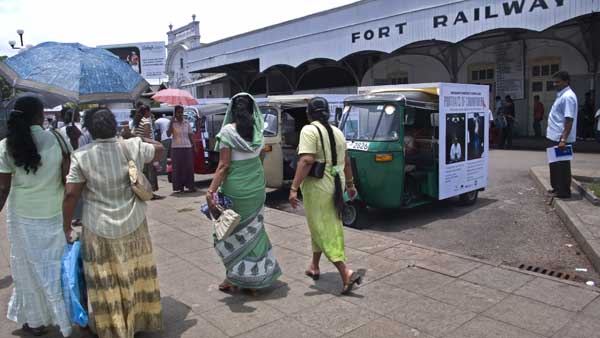
Viewers watching “Portaits of Commitment” at Fort Station in Colombo on the 21st August 2007, as part of ICAAP8. ? Shahidul Alam/Drik/MajorityWorld
A story from Sri Lanka on WAD: Positive & Strong Princey Mangalika on HIV/AIDS
Reviews: IPS. Daily Mirror
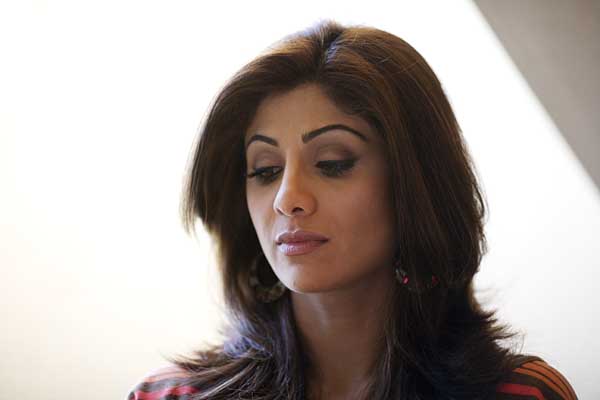
Shilpa Shetty. Actress, Big Brother Winner. Mumbai India. “Being a celebrity has advantages – people hear you. I thought I should make use of this position and speak out.” ? Shahidul Alam/Drik/MajorityWorld
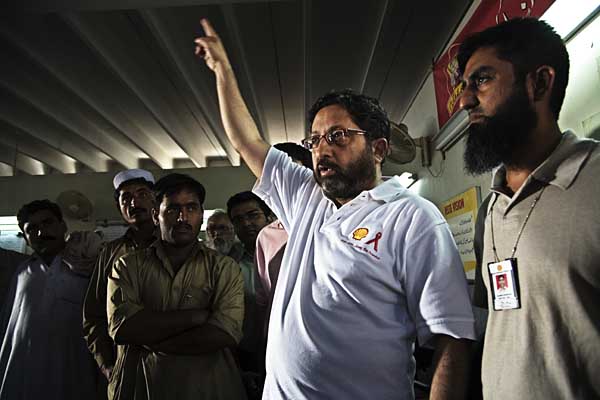
Tahir Baig Barlas. Corporate Manager. Karachi Pakistan. “We have the opportunity to do something now before it’s too late. Let’s not be reactive.” ? Shahidul Alam/Drik/MajorityWorld
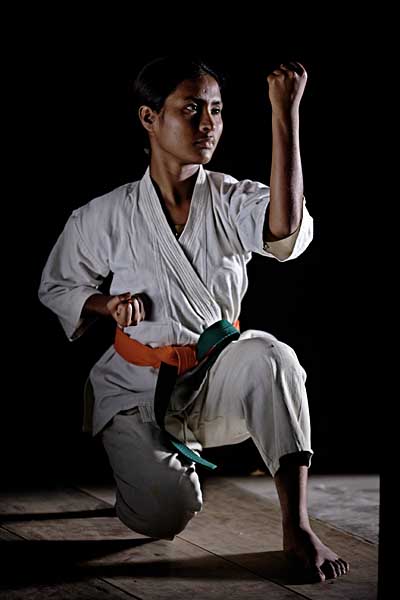
Sabina “Putul” Yeasmin, Daughter of a sex worker. Tangail Bangladesh. “I gave wrong information to make others afraid, as I had been. I had to go back and give correct information.” ? Shahidul Alam/Drik/MajorityWorld
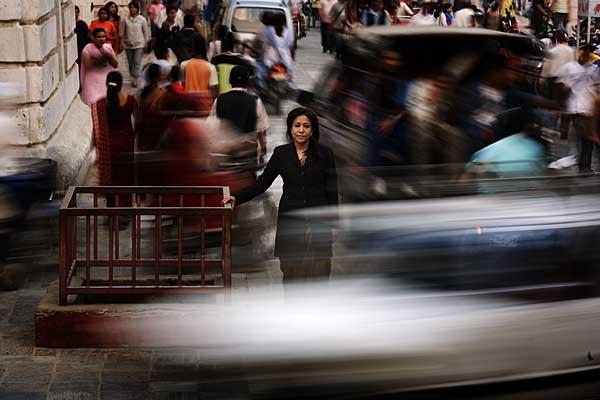
Sapana Pradham-Malla. Advocate. Kathmandu Nepal. “I can’t turn away.” ? Shahidul Alam/Drik/MajorityWorld
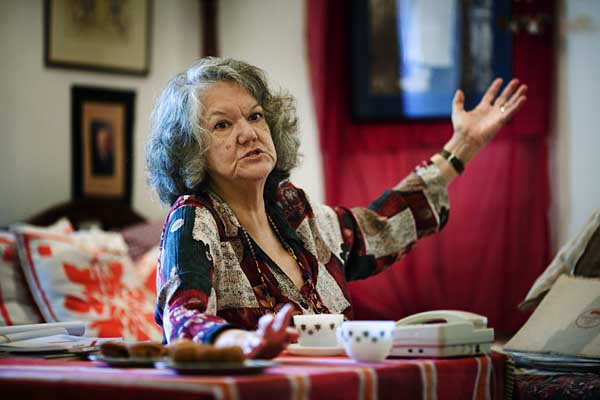
Sally Hulugalle. Community Worker. Colombo Sri Lanka. “I want a better deal for those who are voiceless.” ? Shahidul Alam/Drik/MajorityWorld
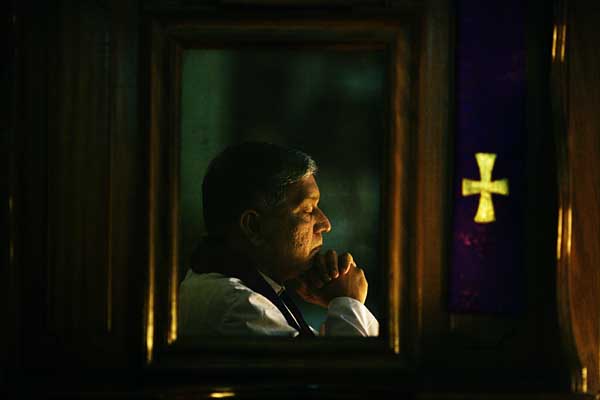
Rev. Alex Vadakumthala. Priest. New Delhi India. “The church finds its meaning when it responds to the challenges of the times.” ? Shahidul Alam/Drik/MajorityWorld
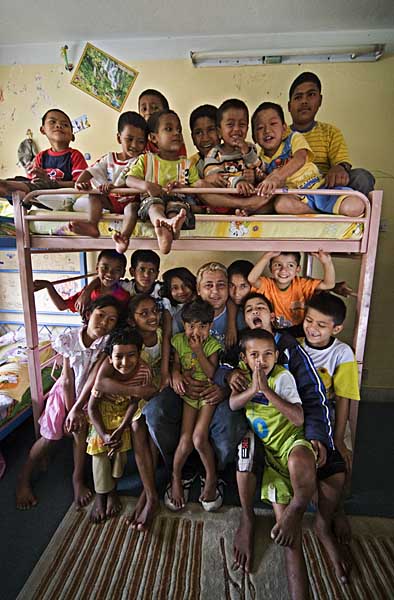
Rajiv Kafle. Former Drug User. Kathmandu Nepal. “I saw a need and an opportunity where I could step up and really make a difference.” ? Shahidul Alam/Drik/MajorityWorld
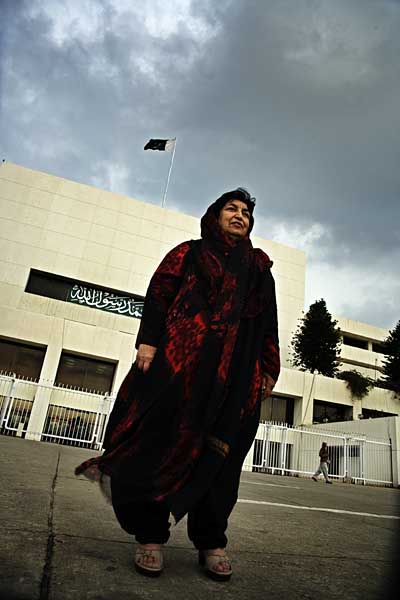
Noor jehan Penazai. Partliamentarian. Islamabad Pakistan. “These politicians have to realise it’s a very serious disease and we have to talk about it.” ? Shahidul Alam/Drik/MajorityWorld
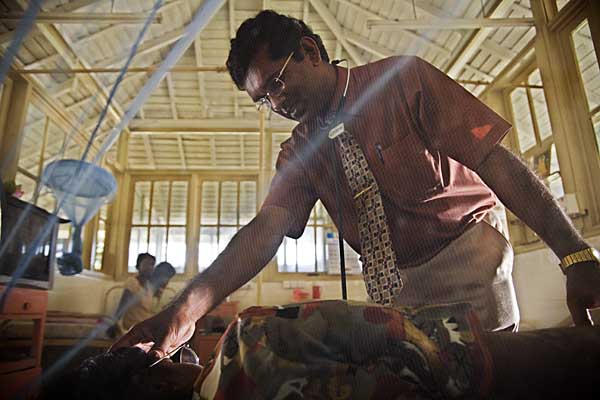
Dr. Ananda Wijewickrama. Doctor. Colombo Sri Lanka. “I had to do something for the patients …they needed a place to go, to be consoled and, if dying, to die with dignity.” ? Shahidul Alam/Drik/MajorityWorld
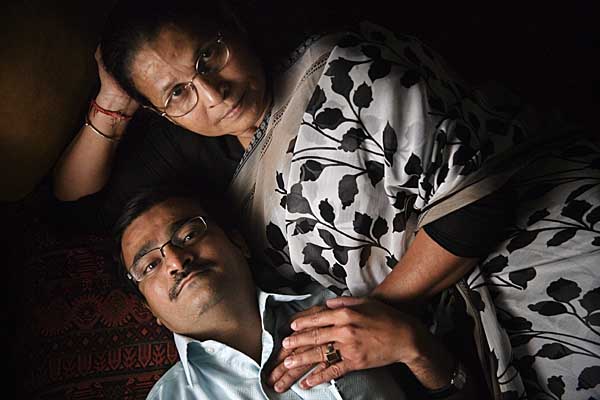
Arif Jafar and Anis Fatima, MSM and mother. Lucknow India. “I am grateful to Allah he gave such a son to me.” ? Shahidul Alam/Drik/MajorityWorld
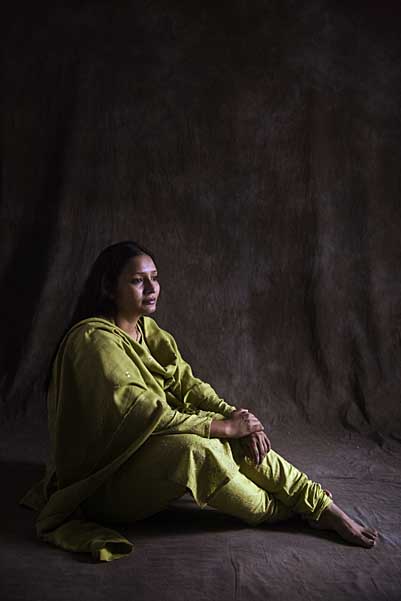
Habiba Akter. Dhaka Bangladesh. Positive Counsellor.
“I have no choice. If I don’t do it no one will.” ? Shahidul Alam/Drik/MajorityWorld
An exhibition supporting the book opens at the Barefoot Gallery, in Colombo at 7:00 pm on the 18th August. 704 Galle Rd. Colombo 3.
